#its like so brilliantly written and also the acting is excellent and also just the cinematography itself is insane. AND NO ONES HEARD OF IT
Text
all about who you know (movie about bisexual joker that has a 4.8/10 rating on imdb) is a literal work of art that has the same level of writing compantacy as orv. i am so serious. everyone go watch it right now
#my experience watching it wqs literally going Oh i notice xyz which COULD mean this but this is a dumb romcom movie no ones heard of no way#it actually means that#and then every. single. time. going NO FUCKING WAY? IT ACTUALLY MEANT THAT????#its fucking good#movie about a guy who Isnt Like Other Girls... my movie script actually means something. and yet. AND YET#its like so brilliantly written and also the acting is excellent and also just the cinematography itself is insane. AND NO ONES HEARD OF IT
2 notes
·
View notes
Text
ANDOR is great, but not like that
Ok, here we go. I need to talk about Andor - I love this show so much, and so I've been watching lots of content about it, especially analysis videos. And while I would technically immediately join in on praising this show into absolute oblivion, I often find myself disagreeing with one specific idea - that Andor is "The Best of Star Wars".
When I first heard someone say that, I didn't know why I hesitated to agree. After all, technically, I'd say they're right - Andor is brilliantly written, has great dialogue, beautiful practical and CGI effects, incredible characters, acting, themes, etc.
But I realised, there's a few reasons why I do not think that Andor is or can be called the epitome of Star Wars.
First of all - I don't think there can be such a thing as "The Best of Star Wars". The franchise is far too massive and varied to pick something out as the best thing. You simply can't compare Andor, a live-action show with a very dark story and incredibly tragic characters, to The Clone Wars for example - an animated childrens' show that will simply have different restrictions (and benefits!).
But secondly...while I adore Andor, I think that it does lack something important to even be considered the best of Star Wars specifically for me. Quite simply, Andor is just too different from the rest of the franchise. It isn't Star Wars enough. Does that make it bad? Oh hell no. They shouldn't be trying to make it more Star Wars! It's perfectly fine as it is! But I think that while it is better on a technical level than most other Star Wars media, putting it on a pedestal over the rest of the franchise is doing a complete disservice to what made SW so popular in the first place. Because no, the OT and especially the PT are not better stories, or movies, than something like Andor. They're kind of cheesy, sometimes a bit muddled, and campy as hell. But I also wouldn't change them one bit (ok, I do have some bones to pick with the PT but shh)! Luthen's speech is amazing, it's beautiful dialogue, nothing in those movies comes close to it on a technical level! But Star Wars didn't get popular through dramatic speeches. In fact, the sometimes stilted dialogue is part of it's charm as a series. The campy sci-fi elements, the humour, it's all part of what makes Star Wars what it is. Andor is excellent at highlighting the more gritty part of the story, and executes the political themes wonderfully. But in Star Wars, for me, it will always just be showing one side of what the franchise has to offer.
This isn't a bad thing. I'm glad Andor does its own thing. But it simply isn't close enough to the heart of this franchise to be the best part of it. And now, here we can argue all day, but for me, the core of Star Wars is and always will be the OT and the PT combined. While I might enjoy the OT more, the PT is undeniably incredibly important to what the franchise is today and so so much to the table. I don't think I need to mention the sequels (but jar-jar binks had more goddamn plot relevance than several sequel characters. just saying.)
But, what I will say, it is the best of what Disney+ Era Star Wars has to offer. Because shedding the classic Star Wars feel for Andor was a decision that makes it a little less Star Wars to me - but it also makes the show work better in its own merit.
And at the end of the day, no lightsaber battle, no cute reference, no beautiful scenery will EVER make up for how much these shows are simply empty husks lacking any real passion or fresh ideas for the franchise.
And it's a real damn shame, because they could all have been beautiful.
But Andor works - not even because of how damn good it is, but honestly because there has to be someone who truly makes us want to love these characters, because they cannot rely on us simply knowing them already. And that's when Star Wars is best! When someone makes something new, and you can just feel the passion and love for the world and the story and characters through the screen. And wether that be through how much George Lucas filling the PT with bad CGI just because he CAN, or through how beautifully tragic Cassian Andor's story is, I truly do not give a fuck.
I went a bit off-topic there lmao, but TL;DR: Andor is brilliant, and better on a technical standpoint than most other SW media. But not only is the franchise too vast to have a "best" part, Andor only shows a very specfic facet of what the franchise can be, and that's completely fine. It's definitely better than all other live action Disney+ SW shows though.
#star wars#mo rambles#andor#genuinely. the PT has so many issues but especially after watching behind the scenes content all i can say is there is so much LOVE#and CARE. in all of it. i'd rather have that than the stale-ass stuff the kenobi show brought to the table.#not to even mention how much the sequels destroyed canon because they tried not to take risks. godDAMN.
6 notes
·
View notes
Text
Tonight’s episodes were a bit ‘eh’. Some very good storylines, some not so good ones. Lots of very good acting all around though.
As a prelude to my reviews: I must admit, the more time passes since the brilliant “Wednesday’s Child”, the more I come to realise what a bad decision this Ollie storyline is. Maybe it’s made for a few good episodes in the short term, but in the long run? Ollie was one of the Casualty kids with the most potential. Harry Collett was fabulous in the role, and I, like many of us, hoped for an eventual story about Ollie developing bipolar - that could’ve been a fantastic storyline to do and I trust Casualty would have handled it brilliantly.
But they threw all that away. And I think the producers will find themselves majorly regretting this decision in the long term.
I am also just so tired of Holby City Hospital staff members having dead murderous sons. I’m tired of it.
The original Henrik and Fredrik story on Holby was a masterpiece. But here’s the thing: that sort of story only works once. Or at the very, VERY least, once in a decade. But Holby kept trying to repeat similar stories for cheap shocks in the hope of getting the same viewing figures and praise as they did for the Fredrik story, and eventually, they sank low enough that they just straight up repeated the “murderous son” theme with Bernie and Cameron, a storyline so dreadful it couldn’t even be saved by the acting talents of the wonderful Jemma Redgrave.
And now, with Holby gone, Casualty has repeated the storyline again with David and Ollie. And although the writing is better than it was for Holby’s Cameron story, the fundamental fact that this is a story that only works once still remains.
Will Casualty try to endlessly repeat and copy this story, become stuck on it, the way Holby did with Fredrik? I desperately hope not, as reiterations of Fredrik were what led to Holby’s downfall. Will they create various storylines or even write in massive retcons just to give David a bunch of “replacement Ollies”, in a manner that’s actually quite insensitive to his grief if anything, the same way Holby gave Henrik “replacement Fredriks”? They’d better not.
“Wednesday’s Child” was an incredible episode. As a piece of drama in its own right, it was BAFTA-worthy. I’m sticking to that. But honestly, it felt like someone wanted to make a one-off or miniseries drama set in the US, got asked to make an episode of Casualty instead, and implemented their idea anyway. This story doesn’t belong on Casualty. It’s not realistic and it’s a waste of what could’ve been a great character.
Sigh.
Onto the actual episodes. I’ll start with episode 1, “Blame Game”:
First of all, “Blame Game” feels like a really boring title for an episode like this. I don’t know what they could’ve called it instead unless they wanted to go full on with the stealing from Holby and call it “We Need To Talk About Ollie”, but still.
Speaking of Holby, it was nice to see Michelle Lipton wrote this episode - I didn’t realise it was her till I saw her name at the start! She hasn’t written for Casualty in quite a while so it’s nice to know we’ll still be graced with her talent, even with Holby over.
It was a pretty damn good episode. Even if it did feel like someone was writing a Dylan/David shipping angst fic and somehow got it onto the screen. That’s not necessarily a bad thing, it’s just... a thing.
Jason Durr and William Beck are both INCREDIBLE actors with an excellent rapport and they knocked it out of the park tonight. Jason Durr in particular so deserves a BAFTA for this.
I’m adoring seeing the Dylan/David friendship revisited, and Dylan doing so much to try to look after David and do his best to protect him in whatever ways he knows how. I do wish, of course, that it was in a better situation.
My heart absolutely broke for David even more tonight. Him just... letting the people beat him up, because he thought he deserved it, was heartwrenching. And those early scenes with him looking through the photos and videos of Ollie were just... gah.
People are saying they think this will lead to David leaving the show. I don’t think it has to in the slightest (Henrik stayed, remember), but I do think it will take a very long while for him to find any sort of normality again after this. Fuck. Poor bloke. :(
Faith is just AWFUL. Whenever I think I can’t hate her more, she finds a way to make everything about herself and how she thinks she’s better than anyone else. I don’t even have words for her actions tonight except “how the fuck does anyone still like her”. I’m glad she got called out on her detestable behaviour for once. And I can’t imagine Dylan going anywhere near her again after what she said about David.
The plot with the boy and the gerbil was weird. Nothing much to say about that.
The sightseer couple were very cute, though. I liked them. It’s nice having so many patient storylines lately.
And I loved the moment when Dylan gave Acting Clinical Lead to Ethan and Stevie was like “so it’s a BOYS’ club?!”, as if she doesn’t know full well she’s tried to get that job so she could literally conspire against people before. Where’s that meme post that’s like “me on trial for murder: You guys just hate women having fun!!”? That’s Stevie.
Episode 2, “One In, One Out”:
I like Stevie as a character. She’s improved greatly recently, and it helps that Elinor Lawless is a fantastic actress. Is Stevie a terrible, unlikeable person? Yeah, absolutely. Do I enjoy watching her anyway? Yes. So I enjoyed this episode well enough, though it wasn’t as good as the first.
Annoys me that Stevie and Marcus have had more onscreen kisses than Henrik and Russ ever got, though. Sigh.
It was nice to see Bex from Eastenders (aka Jasmine Armfield) as one of the guest characters.
Sah getting deadnamed over and over again is so annoying. This is not a necessary thing to do with trans characters! It’s not! Arin Smethurst was great though.
Not sure what to think of the new anaesthetist. He’s just sort of... there.
The robber patients were wild and their story shouldn’t have worked, but it did. I liked them.
Also - a songtage on Casualty?? That just feels wrong, songtages were Holby’s thing.
Anyway, next week’s ep is Ollie’s funeral, with a fantastically chosen episode title - “Parental Guidance”. We’d best all be ready to cry at Jason Durr’s acting for the third week in a row.
14 notes
·
View notes
Text
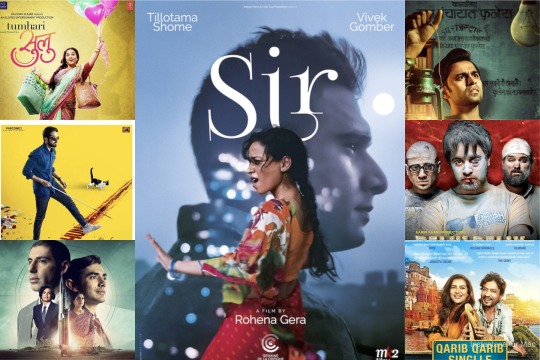
Original Shows and Movies from India
Original Movies and Shows from India that are Beautifully Made, Acted, Directed, with Excellent Production Design.
Here are some highly enjoyable and original Indian productions. They are all so captivating that it's difficult to pick the best among them. So, in no particular order of preference, here are our recommendations for this edition of IndigoKashmir from India:
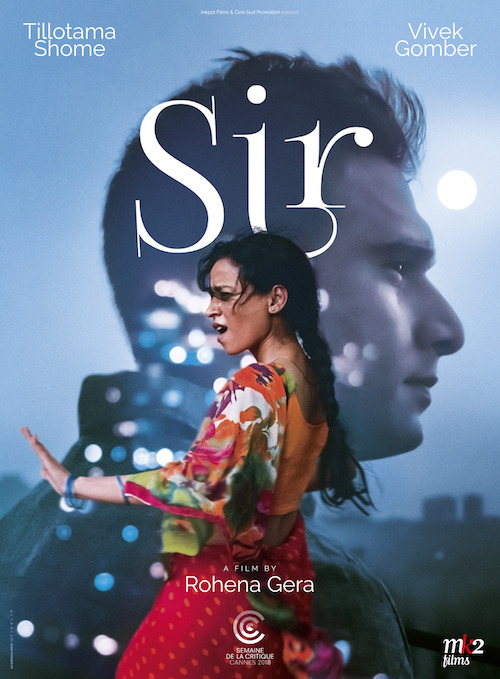
Sir (2018): An optimistic and determined young woman from a remote village embarks on her new job as a live-in maid for the cynical son of a wealthy family. As time passes, they fall in love, but their relationship becomes forbidden. This film is one of the most beautifully written, acted, and filmed movies we've seen in a while. If you enjoyed 'The Lunchbox,' then 'Sir' is a must-watch. While it tells a simple story, it deeply moved us. 'Sir' is a thought-provoking film and has firmly secured a place among our favourite films. We cannot recommend it enough.
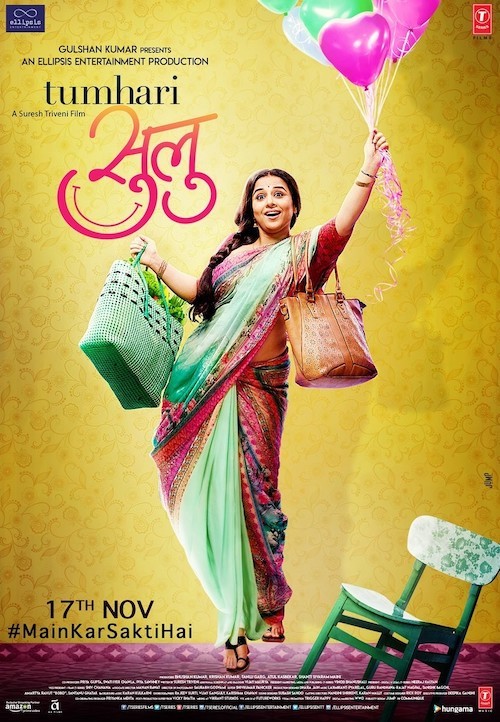
Tumhari Sulu (2017): Sulu is an ambitious housewife with a loving husband and a happy family. Her life takes an unexpected turn when she accidentally lands a job as a radio jockey, and her show becomes an instant hit. This film presents a cute and funny story about a Mumbai housewife with a "can-do" attitude. It's incredibly witty and charming, and we thoroughly enjoyed it. At the heart of its story, the film carries a valuable message. If you're seeking something lighthearted, positive, and fun, be sure to check it out.
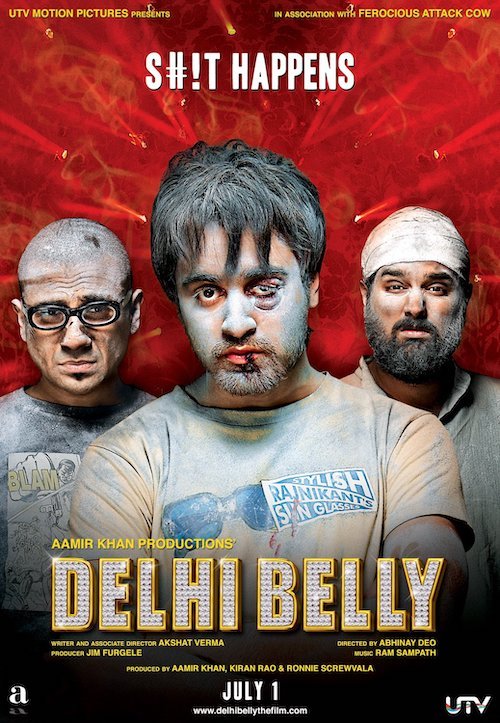
Delhi Belly (2011): Three struggling roommates unwittingly become potential targets of a ruthless gangster. This film is one of the funniest we've seen in quite some time! While it can get a bit gross at times, in this comedy, NOTHING IS OFF LIMITS (as the title suggests). It's a very well-written, brilliantly acted, and expertly directed cinematic gem. We wholeheartedly recommend it; it had us in stitches.
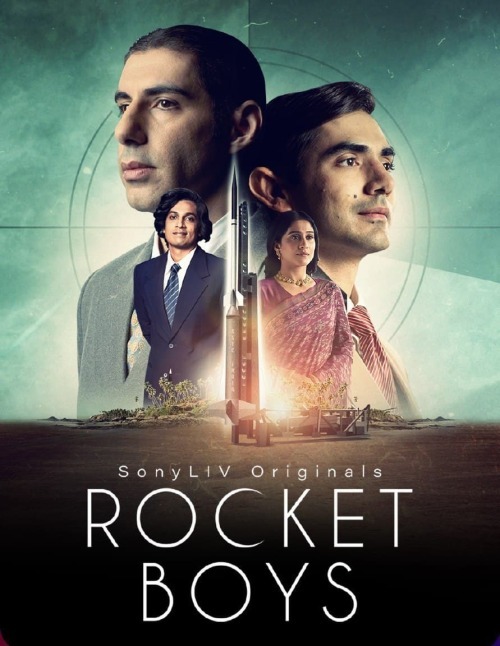
Rocket Boys (2022): This is the extraordinary story of two remarkable men, Homi Bhabha and Vikram Ambalal Sarabhai, who not only made history but also shaped India's future. It's a phenomenal tale of exceptional individuals, captured with exquisite filming, outstanding acting, and masterful direction. We were so captivated by it that we binged the entire series on a rainy weekend. This show is not only thought-provoking, intelligent, and inspirational, but it also beautifully portrays real-life events.
If you enjoyed series like 'Manhattan,' then 'Rocket Boys' is a must-watch for you. The two lead actors, Jim Sarbh and Ishwak Singh, deliver brilliant performances. What's truly commendable is how the show remains focused on the scientists and avoids getting entangled in politics, allowing the story to shine through without distractions. (Season 2 arrived earlier this year and it was just as good as the first one).
If anyone knows who was responsible for the exceptional set and production design, please share! It added to the show's beauty. 'Rocket Boys' is a beautifully shot series that's truly worth your time.
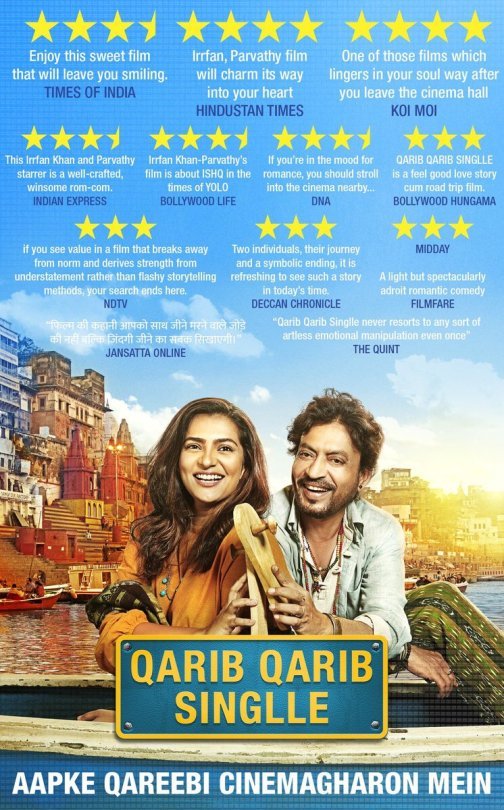
Qarib Qarib Single (2017): Two contrasting personalities, Yogi and Jaya, connect through a dating app and embark on a journey to revisit their past, rediscovering themselves along the way. This film is a delightful, sweet, feel-good, and charming experience. It weaves a beautiful, heartwarming, and lovely story, all set against the backdrop of a road trip across India. We highly recommend it if you're looking for something easygoing, joyful—a film that will surely bring a smile to your face.
Let's also take a moment to remember Irrfan Khan; he was an extraordinary talent who left a lasting legacy.
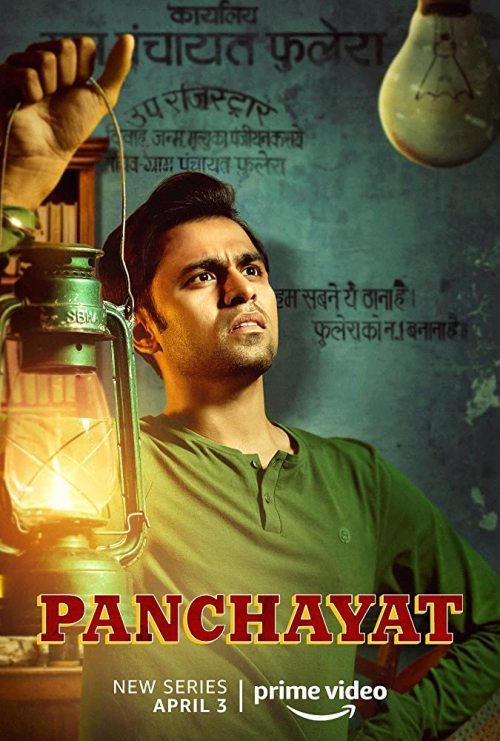
Panchayat (2020): It is a comedy-drama that follows the journey of Abhishek, an engineering graduate who, due to a lack of better job options, takes on the role of secretary at a Panchayat office in a remote village in Uttar Pradesh. It's a positive, imaginative, funny, heartwarming, original, and endearing series. We absolutely loved every aspect of it and highly recommend it. (Season 2 was just as good and there will be a season 3).
This show carries a meaningful message at its core and remains refreshingly original. The cinematography and soundtrack are also phenomenal. A word of warning: it might inspire you to consider a simpler life in a village. The creators of this series display comedy genius, and in our humble opinion, comedy is one of the most challenging genres. It's easy to make people feel miserable, but it's much harder to make them smile. The simplicity of the village depicted in the show took IndigoKashmir back to the carefree days of childhood. Those were undoubtedly the golden years.
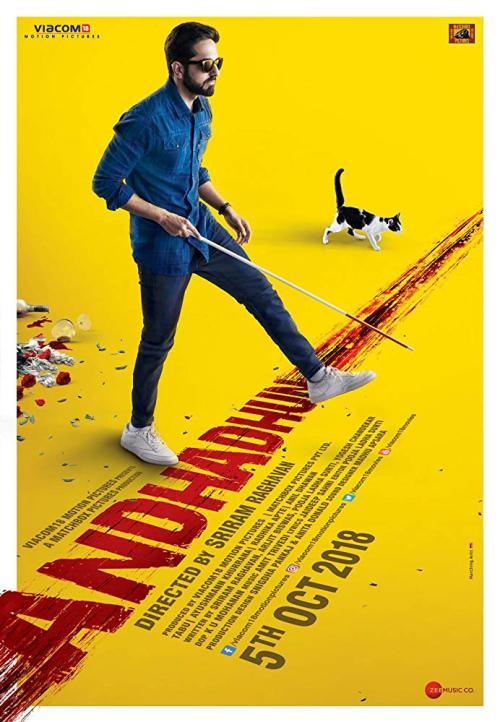
Andhadhun (2018): "Andhadhun" unfolds a series of mysterious events that alter the life of a blind pianist, forcing him to report a crime he never actually witnessed. This film completely blew us away. It's a black comedy, so be warned: if you're expecting slapstick or the usual style of comedy, it may not be for you. Instead, this movie seamlessly weaves a story within a drama, within a thriller, within a horror. It's an absolute masterpiece, and we cannot recommend it enough.
We'll be back with more original selections from India. We hope you enjoy these recommendations, and if you watch them, please let us know what you think!
#Made in India#Indian tv#indian movies#Sir#Movie recommendations#what to watch#Set design#Movies & TV
1 note
·
View note
Text
In light of the new Owl House episode, I have some THOUGHTS about its excellent writing.
So, first things first, I wanna state something that everyone knows but we also kinda forget sometimes; TOH is a kid's show. Yeah, yeah, that's obvious. But also, that GREATLY impacts its writing. However, it also balances this type of writing PERFECTLY with the adult perspective on the world which ultimately does make it great for all ages. And "Yesterday's Lie" is the ULTIMATE example of this.
Luz's story fits the typical isekai plotline - but it also is an example of what real-life kids in Luz's positions want. Like think about her life in the first episode - she had no friends, she wanted adventure and fantasy and magic, and her mom and she weren't seeing eye to eye. She then got whisked away to a magical realm full of adventures, magic, friends (and a girlfriend!), and a mother figure who tries hard to understand her and loves the fact that they're both weirdos. The Boiling Isles is heaven for Luz, just because it's fulfilling all her wants and needs that she wasn't getting in the human world.
As someone who is going into the professional writing field and spends a lot of time in and out of class thinking about writing rhetoric, I've taken one or two classes about writing children's stories/media. And, obviously, children's media is written differently than adult media -- but specifically in the idea of values. Kids value different things than adults because of their perspectives on the world. Hell, the whole reason "whisked away to a magical fantasy world" is so popular in kids' media is because so many kids find themselves in that position in wanting that to happen to them. I sure as hell did when I was Luz's age.
Stories like these essentially are wish fulfillment for kids. And since they are wish fulfillment, that typically means that more real-life concepts such as abandoning family, missing the "real world", or any negative consequences are either conveniently written out in a satisfying way or are left out entirely. (Think how in Harry Potter, he's able to escape the "real" world without negative consequences because his family's abusive.)
(Also, fuck JKR btw but just using this example because this is the example we used in my one children's lit class.)
And what I'm about to say next also explains further how TOH is wish fulfillment, but it starts as a bit of tangent first. Just bear with me, it'll make sense.
Anyways, I've seen a few MP100 posts around that praise the show for having an adult "step in" and tell the child protag that they don't have to fight the villains because they're just a kid. And to me, that shows how MP100 is an adult-focused media -- because a piece of children's media would NEVER do something like that. That's not to say that children's media encourages kids to do dangerous stuff that harms themselves, but it's just not appealing to kids. Kids want to be the ones going on adventures and saving the day. They want to be treated with respect and be trusted as capable as the adults around them. And who can blame them? We all want that - it's just that kids hardly get ANY respect or autonomy. That's why kid's media where the kids are allowed to fight, be the chosen one, or go on adventures is so normal and popular: it's what kids want!
And that, again, is how TOH is wish fulfillment. Luz is allowed to go on adventures, do dangerous and stupid things, and she still kicks ass! Sure, Eda might express concern for her or say she doesn't want her doing something dangerous -- but Eda trusts Luz and is never angry when she goes someplace dangerous (think how she acted in "Separate Tides" when she found out Luz was also there in the cave).
So, ultimately, this is all how TOH's writing reflects its status as a children's show. Which is totally fine! And it's brilliantly written!
But as for the more adult-focused parts of its writing -
To state again, adults value different things in media than kids do. We (since I'm an adult) typically do want to see the more nuanced and darker side of things. We want the complexity. We want subversion of genre. We also want things that reflect our experiences. And TOH does this by addressing realistic negative consequences.
Camilla was upset that Luz left her. She cried and got mad, and even asked the questions of "Were you trying to live out some witch fantasy? Did you hate living with me that much?"
This is a genre subversion because we usually don't get this kind of confrontation in a kid's show. Typically, our plucky young protag who chooses to stay in another world faces no negative consequences for this choice (except for Marcy in Amphibia but for different reasons lol). But here Luz is, watching as her mother cries all because of her choices. It's not explicitly adult and tbh isn't mature - but it's still a level of nuance and character complexity we don't typically get in a kid's show/media. Honestly, it's most likely that adults are the ones identifying with Camilla instead of Luz in this situation - even if we don't have kids. Camilla, essentially, feels abandoned and rejected by her daughter. While some kids might be able to sympathize, it's probably mostly adults (and older teens) who have been through similar situations and emotions. And, in that, shows how TOH can also appeal to audiences in a more "adult" way as well.
But, despite that, it's still not a polarizing scene. It may frustrate some kids watching (or even teens/adults who identify strongly with Luz), but ultimately Camilla's words and actions are still understandable. She's not being evil or mean; she's just hurt. And that's clear! Even Luz sees it! But it doesn't harm the narrative appeal of the show being kids' wish fulfillment because Camilla can't do anything to take Luz away from her amazing life in the Boiling Isles. While she did make Luz promise to find a way back and to stay for good, she ultimately has no power to do anything. The status quo of the show is not changed and it is still wish fulfillment -- though, now, it just has some complexity added to the situation, plot, and characters.
In that sense, the scene where Camilla confronts Luz can still appeal to kids and doesn't make the show unenjoyable for them despite it being a more "adult-focused" scene. Sure, it adds complexity, but it's a type that kids can understand.
And that, basically, is just brilliant writing. It's such a perfect balance of adult and kid-focused,m and the writers definitely understand the values that both children and adults have when approaching media. TOH is definitely one of the best-written cartoons of this decade, and I'm so glad it exists.
Anyways, here's my essay. Thanks for reading if you got this far!
#the owl house#toh#owl house#yesterday's lie#the owl house spoilers#the owl house meta#me rambling......on and on........
100 notes
·
View notes
Text
Let’s Talk Calm-ly about Two Loves
OR: When you’re a grown man who writes stories for a living, you definitely wrote your own weird bedtime story, too.
The TLDR here is that H has taken one specific listener around the globe, notably to Tokyo and Jamaica. He quotes an old Victorian Poet who was an awful human but who’s lasting legacy is the phrase “a love that dare not speak its name” which is - you guessed it - a reference to queer love. He also is super excited to spend what seems like the foreseeable future with this listener and has bought a little house with a garden of daisies with them and it’s very sweet and domestic. Anyways this is a wild time and it’s all under a cut because it’s...really a lot.
Anyways I think the people I owe thank yous this times around to are @queenlokibeth who had to listen to me scream about this for a while, Astrid, who screamed with me when this came out, and “M” who convinced me to finally get to work in this fandom. And, of course, all of the lovely people tagged below who’s work I used to build my argument.
1.) Who Wrote “Dream With Me”?
Well, not H, or so the story goes. Two other people (Steve Cleverly and Sanj Sen) did! I mean, right, okay, for a while I was like...that seems like an odd choice for a man who didn’t want to hand Two Ghosts over to his own band because it seemed too personal. He wrote on every song in both albums’ he’s released thus far, because he seems to be passionate about telling the stories he wants to tell (even if he won’t tell you explicitly what they’re about). But for a while, I was totally going with the flow there, and the rest of this analysis would still stand: the writer of this story definitely referenced a poem by Lord Alfred Douglas and Harry’s own songs.
However, I then read this fun quote from the Co-founder and CEO of Calm:
“Well,” he said, “The the Harry Styles one is interesting because that came purely from Harry Styles himself...we took the approach of creating a sort of musical epic poem – he doesn’t sing, it’s spoken with poetry, but there’s a sort of musical sound bed to it and it’s pulling on things and themes that Harry’s fans really adore about him and associate with him. So his story was driven really by him – we really created a concept around him.”
- Chris Advansun, July 7th, 2020 via @hlupdate
And I thought, hmmm. This does not sound like a project that he was not involved in creating. From this point on (July, 7th 2020), I began to think of it as a three way co-collaboration between him and the other two authors. But this confused me a bit, because there was largely a nonreaction from the fandom. I was waiting for an actual transcript, because I always fall asleep to these meditation stories, but it was being referenced to as some sort of Y/N fic, which was...honestly not what I expected, but also not implausible, thanks to the ~lovely~ image this man has had since the age of sixteen. But also, twitter seemed to be concerned by other things at the moment, and no one was analyzing the story. .
In fact, I messaged a friend the day that this story dropped, because it had been kind of a shit show day on Twitter. Rumors were sort of flying about everyone and everything: had Liam shaved his head? Was he engaged? Had he and Maya broken up? Were Zayn and Gigi engaged? Had they broken up? Did Niall have a girlfriend? (this one was true lol). Were Elounor engaged? Were they pregnant? Had they broken up??? My personal fav was the bald Liam rumor, which he promptly put to rest in LP Act 1 by...having a huge mane of hair.
So then I thought - huh. Why has today looked like this? I’m not saying that there aren’t days that twitter goes wild because of boredom, because there definitely is - the articles about secret meetings in Italy that are coming out this week (8/12/2020) are proof positive. So that definitely does happen, but it doesn’t usually happen on the days that there’s a lot of content. And maybe I’ve just been starved for content in this fandom, but I would consider a 40 minute video quite a bit of content.
Then the transcript dropped. I’m using two as references - this one on Wattpad and also @carl-and-pearl ‘s version here (thank you so much for the transcript!!). We’re going to get into a more detailed description of what’s going on in the story, but the first thing I recognized immediately is that it was first person POV. I knew that going in, based on the number of Y/N jokes going around on twitter. Then I read it aloud, and I realized that it read like a letter. Like an experience specific to the writer and the reader. And while that’s not super uncommon to write about an experience from the author’s POV - I listen to a podcast called Nothing Much Happens: bedtime stories for adults which has a similar concept - I thought it was odd that they were trying to include both the author and the listener. I completely understood why the y/n jokes were pertinent. But at the same time, it felt like something had snagged in my mind - like a particularly annoying splinter.
The conversations I was having around this story - completely based on the content, concept, and my own instinct - was that this story contained specific references to one person. I thought that it did read like a love letter, and that most identifying features would have been taken out, but the essence remained. Which, once I thought about it, was something that H excelled at doing. Think about Sunflower Vol 6 and Adore You and Canyon Moon and even Watermelon Sugar and Golden. Ask yourself, What do I know about the person they are about? They have skin that browns, they have a secret, they have mesmerizing eyes, they’re willing to dance in the kitchen with him (to dancehall), they have a belly, they’ve been through hard times, they’re witty, they have an accent, and they have lips. I know - super specific right?
So the splinter grew into a thorn - what was I missing? And then - when I was looking for something completely different - I stumbled upon this old interview Harry did with Zach Sang and the Gang Show back in 2017. For context, he was being asked about Sweet Creature. As you can imagine, it’s hard for people to believe he wrote such a beautiful love song when he hadn’t ever really had a long term relationship (two hearts in one home?? Who did you move in with, you can imagine them asking. When did you have time?). So what did he have to say about this?
"In my opinion,” he explained, “I think most songs are written for one listener. Maybe there's one thing in there that only they'll notice about them.... It's so much easier to say something in a song than it is to say it to someone and I think it's really amazing to be able to communicate through that and be able to wrap up everything that you want to say in three and a half minutes and say it in a song."
- HS, May 3 2017
By this time, please believe that I was screeching. Seeing this felt like he put into words the exact feeling I had about “Dream With Me”. It felt like a nod to someone that I didn’t know, which made the story hard to listen to, tbh. Although, I will say that when I did finally listen to it, it knocked me out and gave me odd dreams so. Once was enough for me haha!
So my new operating theory is exactly what Advansun said: I think that H was the primary writer/the driving force behind the story. Because of the references I’m about to run through, because it feels like the way he tells stories, and because they admitted to him being more involved than they originally claimed. That’s going to be how I write the rest of the analysis - under the impression that H had a direct hand in the story that was being put forth. However, I think that the analysis itself would stand whether or not he wrote any of it. It would just be a more tenuous reflection of him than I believe it to be.
2.) How Do I Love Thee? In Two Ways.
Before I jump into the story, let’s talk a little about the poem that I want to compare it to: Two Loves, by Lord Alfred Douglas. Let’s be clear this is not at all a defense of who Bosie was - he was a terrible person, particularly in his later years, when he’d converted to Catholicism and turned his back on his younger self, and his partner, Oscar Wilde. He was violently anti-Semitic, and turned his back on his own community. I want to get this out of the way because I very much believe that we should examine artists for who they are. That is, after all, what I am trying to do here.
But his poem Two Loves has often been used - much to his disappointment, I’m sure - as an exploration of queer love in Victorian times. A line that I will be exploring more deeply in a second was in fact used against Oscar Wilde in his trail for indecency . He attempted - unsuccessfully - to explain it away, but it was too blatantly about their relationship for even the British Victorian society to ignore. I really, really recommend a read of this poem, because it is - despite it’s author - a good piece of work, which explores the themes of shame and love and longing between two men in that time.
I’m going to start with my own background, as someone who’s analyzed fandoms before. I first came across this poem in the Sherlock fandom, with this analysis by @the-7-percent-solution, when I was running in that fandom, and she explains the poem brilliantly in just a few lines. I’m going to take a little longer to run through it, but if you want a concise explanation and a brilliant meta, I encourage you to run to their blog and check it out. That fandom taught me most everything I know about catching symbols and recurring themes and “clueing for looks” and I love it desperately, still.
But we’re here to talk about this fandom, so on with the poem! Essentially, the poem outlines a dream the speaker had: In his dream, he’s standing in a field with flowers - beautiful ones of all kind - and he meets this young man with clear blue eyes and bright red lips and they kiss a bit and have a picnic, and it’s all lovely. If you think I’m kidding, I’m really not. Please, read it for yourself.
Anyways, after they did they did the whole picnic thing, the speaker and his date go on a walk in this field, where they come across two figures. The first is described as,
“...fair and blooming, and a sweet refrain
Came from his lips; he sang of pretty maids
And joyous love of comely girl and boy,
His eyes were bright, and 'mid the dancing blades
Of golden grass his feet did trip for joy;
And in his hand he held an ivory lute
With strings of gold that were as maidens' hair,
And sang with voice as tuneful as a flute,
And round his neck three chains of roses were.”
- Two Loves, 1894
The speaker, however, was drawn to the second figure:
“He was full sad and sweet, and his large eyes
Were strange with wondrous brightness, staring wide
With gazing; and he sighed with many sighs
That moved me, and his cheeks were wan and white
Like pallid lilies, and his lips were red
Like poppies, and his hands he clenched tight,
And yet again unclenched, and his head
Was wreathed with moon-flowers pale as lips of death.
A purple robe he wore, o'erwrought in gold
With the device of a great snake, whose breath
Was fiery flame..”
- Two Loves, 1984
Of course, the speaker immediately asks the second man who he is. The second man says, “My name is Love”. The first man corrects him quickly:
“ He lieth, for his name is Shame,
But I am Love, and I was wont to be
Alone in this fair garden, till he came
Unasked by night; I am true Love, I fill
The hearts of boy and girl with mutual flame.”
-Two Loves, 1984
The second man sighs and acquiesces, “Have thy will. I am the love that dare not speak its name.”
It was, of course, this last line that really gave the meaning of the poem away. It was the line that was put to Oscar Wilde as proof of a romantic relationship, it was the line that went down in history as a way to refer to queer love, and it was the line that first stuck out to me when I was reading “Dream With Me”.
The reading here is clearly that “Love” is the love that is acceptable to society - easy, sweet, and cherished. “Shame” is the love that happens in secret - beautiful, alluring to the speaker, passionate, anxious ( as can be seen in the clenching and unclenching of his hands), and proud. He refuses to call himself as anything but what he is. The first man may call him Shame, but he refuses the name, and instead, offers a qualifier to his own descriptor. He is still love, he is just the love that can’t be spoken about.
3.) Walking in Golden Fields of Sunflowers
Now let’s talk about “Dream With Me”. I’m ignoring the first few stanzas (from the line “Have you ever wondered” to “What the two of us can find”.) because those are pretty standard introductory paragraphs to a guided meditation. So we start with the line “Let’s travel now to moonlit valleys...”.
I’m going to do the same thing I did with “Two Loves” first. I am going to describe literally, in general terms, what happens in the story. Warning, I change pronouns from “they” to “you” because the whole thing confuses me, but note that I’m always talking about the speaker and the listener:
So after doing the standard intro, the speaker and the listener take a walk through the woods enjoying nature, particularly the grass, the trees, and the blue sky above. You’re already clearly in love. Then you’re magically on a raft, with cherry blossoms all around you. If you want a good visual for that, here’s a site that has pictures from a boat rental in Tokyo where you can snuggle on a raft in the Chidorigafuchi moat. And then suddenly it starts raining, and they (you) watch the rain for a hot second, and then the scene magically shifts again, and you’re under a porch (although I guess it could be the boat rental’s porch. They do usually have covered areas).
Kind of furthering that theory, they then lounge by the shoreline, skipping stones and hanging out, looking at the snow capped mountains. In case you’re curious, because at this point I sure was, you can see mountains from certain areas in the city of Tokyo.
Anyways, then it’s snowing, and you’re magically in a cabin, just chilling by the fire, and you fall asleep again. You wake up somewhere else.
Where are you now? Well, you’re on a tropical island filled with palm trees. As an American, my mind immediately jumps to the Caribbean, but I suppose it could absolutely be in the Mediterranean as well. The island has white beaches, mangroves, a turquoise ocean, and a gorgeous, peaceful atmosphere.
If you’re curious as to what a mangrove looks like - and I certainly was - they are a group of trees and shrubs that live in the coastal intertidal zone and Jamaica is doing a massive restoration project involving primary school children to regrow this vital part of their ecosystem. More interestingly, there currently exist no mangrove forests in the Mediterranean, so my initial feeling that this scene would take place in the Caribbean was correct. On that note - again, because I was curious - Jamaica has gorgeous white sand beaches with turquoise oceans.
But I’ve gone off topic again! After you’re minds are “in tune” once more (trying to find a heartbeat, anyone?), you reappear in a meadow, with beautiful flowers of all kind, where you are now walking hand in hand through a field of sunflowers, which give the feeling a “warm and golden hue”. Then you come across a little farmhouse with daisies poking out (clearly I have no way of locating this anywhere in the world, but I assume that the UK has both sunflowers and daisies). It’s an empty house which was loved and left because of the passage of time, which inspires my favorite line in the poem: “ The thought of passing time inspires/A feeling that grows stronger”. It’s just...really sweet to me.
So, of course, they do what anyone would do when they come across an empty farmhouse, they go inside. And there, they begin to fall asleep, reflecting on all they have just seen, referencing other scenes of the poem: “ Moonlit valleys,
Burdened forests, Gazing at the ocean. Summer meadows, Tranquil sunsets steeped in emotion”.
The next few stanzas are just going to be copy-pasted, and then I’ll go into them a bit, but this is the end of the poem, so they’re the final reflections;
“The tenderness we feel
When we are close
Two minds as one
Surrounds us and connects us
But we’ve only just begun.
For now we dream together
Of all there is to follow.
And know that sleep will keep us safe
From now until tomorrow.
Maybe all the memories
That we’ve gathered here tonight
Are all dreams now remembered
Or wishes in plain sight.
No matter what
They’re with us now.
For this night and forever.
And every time we close our eyes
They’re yours and mine to treasure.”
- HS, Dream With Me, via @carl-and-pearl
And that’s it! The literal story, in short, is that you started in a forest, then went to Tokyo (maybe) and then Jamaica (perhaps) and then back to a field of sunflowers and daisies in the UK (which is also a guess, it could be Italy or France or Idaho for all I know, but let’s call it an educated guess).
4.) My Dream Journal
So now that we know what happens in the story, how do we interpret this? Well, There are a few lines in the poem that I want to draw your attention to: the first takes place in the first part of this story, when you’re still in the forest. This is, I must say, the most direct reference to Two Loves in the whole poem/song/story. Both works are describing a walk in the woods with your loved one, and, in a fun reference in the middle of the story, Dream With Me says
The shimmering reflection
Shows us smiling from above.
But what we think
But dare not speak
is L-O-V-E love.
-Dream With Me, 2020
Remember that line I mentioned before? I am the love that dare not speak its name. Right, so that’s almost a direct quote. It also has a really fun nod to “I Would” (Would he say he’s in L-O-V-E?/Well if it was me then I would), but I digress.
This first part of the narrative, I feel, really sets up what the rest of it will look and feel like, in the same way that “Golden” sets the tone for Fine Line. (You didn’t think I was going to make a post about Harry and NOT mention Golden, did you?? If you did, I’m disappointed!!). So let’s take a look at what’s happening, and the language he’s using to describe it.
One of the best things about this poem is how vivid it feels. Of course, I’m about to argue that it’s vivid because it was based in reality, but let’s talk about the sheer amount of detail he uses to describe the place he’s walking through. The valley (canyon lmao) is moonlit, the grass and the leaves make mosaics of green, you’re walking by the heather (the symbolism of heather is good luck, admiration, and protection), the sepia sunlight breaks through the trees.
You know what it kind of sounds like? Sweet Creature. You’re about to roll your eyes at me! I can feel it! But listen, okay?
“Sweet creature
Running through the garden
Oh, where nothing bothered us
But we're still young
I always think about you and how we don't speak enough”
Which, to be honest, sounds like what they’re doing. They’re walking through the garden in the sun, not daring to speak about the Love that he (they both) feel, and instead refering to it in veiled Victorian terms.
And then we head to Tokyo! I know that you’re about to ask me why I think it’s Tokyo versus...idk, anywhere else? Well, for one, he went to Tokyo (to let it go) publicly in 2019. He was there for a few months, and there are some great pictures of that time:

Look! Here he is with his club owner friend and his dog, and a fun red bandanna! But let’s be honest, the dog really steals the show here. But wait! there’s more! More dog content, too!

This was on Jan 31st, 2019, and he’s taking the dog for a walk! Very cute! If nothing else, he spent a lot of time with dogs in Tokyo! And the city fits the description of the story. So I feel rather comfortable with my interpretation that this first date is a memory of this trip - or another - to Tokyo.
So what did “you both”do in Tokyo? Well, chill on a raft while the cherry blossoms flutter around you, clearly. You also refocused your purpose. What did he do in Tokyo in 2019? Well, he took time to think about and write songs for the album he was about to go record. Kind of like refocusing on what’s next, right? And then, in the story when “you both” had time to think amongst the lake and the water and the rain and the moon, and you’d come to the conclusions you needed to, you left. What did he do when he did the things he needed to? Well, he left, too.
And where did he go? Well, in real life, I suppose he went to do his job. But, in the story, you’re meant to be falling deeper and deeper into sleep, so it’s sort of like traveling backwards, you see? Like counting down to one. So you end up on this island with turquoise ocean and mangrove forests. I’m calling this Jamaica. Why? Well, the description fits, for one, down to the four types of mangroves that exists within its ecosystem.
And - probably the biggest reason - I can place him there, too. Here’s him in 2017:

I added this picture because the water around him....looks rather turquoise, doesn’t it? Kind of like he’s enjoying his time on a tropical island by the beach?? Oh, and here’s another one!:

The red bandanna makes a comeback!
So what are you doing in Jamaica, according to the story? Well, you’re hanging out, basically. Enjoying the beach and each other, of course! What else? To be exact, “[Your] thoughts dovetail and unify/ In tune two minds together”. I’m so glad that you’re tuned like an old guitar now! Congrats! Really happy for you!
What was he doing in Jamaica three years ago? Why, he was recording his first album, or so the story goes. I’ll tell you something: finding press for that album was literally the most difficult part of this whole analysis. I got a fair bit of the tattoo roulette with Kendall Jenner, and some things about Carolina, but the interview with Zach Sang took me like an hour and a half to find again to link. The fact that a lot of it has been buried is...not great, for posterity purposes. He’s going to want that one day.
But I’ve gotten off track again! We gotta go back and finish our story, right? What happens now? Well, this does:
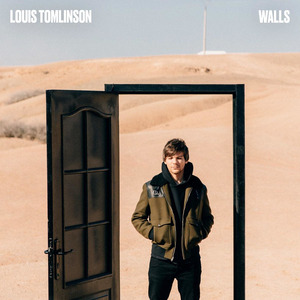
hahahaha okay, I’m really sorry, but I had to. I’m not, actually, making it up though! According to the story:
“ As minutes turn to hours
We drift off somewhere new.
And visualize a stairway
To a door we now walk through”
- Dream With Me, 2020
So maybe Louis was just...demonstrating for you.
Anyways! Where do you walk out to? A golden field full of sunflowers. You walk for a minute, then come across an old house with daisies popping up out of the garden. And that’s where the story ends. I guess you’ve made that farmhouse feel like home.
Now to the little reflection he does on the outro. The lines I want to bring your attention are: “The tenderness we feel when we are close two minds as one surrounds us and connects us but we’ve only just begun” and “Maybe all the memories that we’ve gathered here tonight are all dreams now remembered or wishes in plain sight.”
Let’s talk about the first sentence first. In the context of finding a home that could be a shared home, and a future, this is very much an “end of the story, beginning of our lives” sort of thing. You’re back from all over, and it’s time to settle down, and see what’s next.
And now the second sentence. I think this is the one that really drives my point about this story being a collection of memories he has - that’s what he calls it. The story is “gathered memories” that might also be called “remembered dreams” (think of how people say of vacations, “oh it was a dream!”) or you might call it “wishes in plain sight”. This feels in line with the rest of the story. In this stanza, he’s sort of letting you in a bit. If I’ve read this right - and I really think that I have - he’s giving the larger context for the story. It’s a collection of memories he’s had with someone he loves.
5.) Cool! Can you prove it?
I mean, I’d argue that if you read this far, I have proved it, but let’s make some more links, shall we? This was called a “muscial epic” that was “driven by him”. I’d argue that if I know my Victorian literature (thank you, Sherlock!), then he definitely does. Then there’s the fact that he quoted it, so. That did happen. And he knows what it means. And even if he didn’t, there were two other people on the story. Someone was more than capable of catching that one, and the fact that they didn’t speaks to intent. They want you to think of that phrase when you read this poem. They want you to think of that walk in the woods while you’re going on this one.
And, as for my assumption that this is for and about one person, well. Think about it. He said that he writes his songs for a single listener. I’m not saying it’s the same listener each time, let’s get that right, but it is always just for one person. With that, and with the assumption that he’s been involved in the writing of this story, I’d say that the same rule applies. He went with someone to Japan and Jamaica (J^2 haha). And, if I had to guess, it was the same person.
Why, you ask? Well, for one, if that weren’t the case, then this poem would no longer be for one listener, it would be for multiple. And, for another, imagine how awkward it would be to listen to it with his current partner and have to explain “oh, yeah that was the super romantic vacation I took with someone else” . And, I suppose that because I think that attitude of “refocusing” and “dovetailing” and “tuning” and getting excited about imagining all of the tomorrows with your partner speaks to a long term relationship breathing easily, you know?
I’m also going to argue that describing the aura around the house as “golden” was intentional, especially when paired with the location - in the middle of a field of sunflowers. Those are both direct references to his songs. And those two songs are particularly linked by the number 28. The third song that features 28 is Fine Line the song, but that’s a different story. Anywho! “Golden”’s bridge just repeats the word ‘golden’ twenty eight times (if you go here , you can count the bridge) and “Sunflower Vol. 6″ ends the song with 28 “boops” (believe me, I wish I was making this up. I’m not.). So then, once again, you’ve linked a story to two already linked songs.
And, even if you don’t buy the intentional repetition, they’re linked another way, aren’t they? The color scheme and the sun symbol. Sunflowers were named because of their sun-like appearance. They turn to face it. They symbolize loyalty and adoration. And then, of course, the sun is - say it with me - golden. And it - like the person in golden - waits in the sky, beautiful and dangerous and constant. And here that symbol is, in a farmhouse in the middle of nowhere. At home.
This whole story feels like you’re taking the time to find that heartbeat that you think you might have lost, and sort of coming back to a space where you understand that this is what you want, now and forever. It feels like finding a home that could be yours forever, and it feels like walking through some of the moments that remind him of that.
It really is rather lovely, if you think about it, especially since he has a tendency to attribute “home” to people rather than place, in his songs. So it’s like. Going all around the world and always being at home.
#harry styles#calm#dream with me#two loves#honestly man#im happy for you#but ewww#be less sappy please#i mean#SOME OF US DONT HAVE THAT YET HAROLD#hahahaha i think im funny#long post ts#idk how else to tag this but im really proud of it#okay now i'll do the penguin song#promise hahaha
552 notes
·
View notes
Text
In Defense of The Angry Birds Movie

When it comes to movies based on video games, more often than not they're recieved less than favorable by critics and audiences. The Angry Birds Movie was one of those video game based movies that critics didn't care for and most audiences thought it was okay. I'm of the rare opinion though that this movie is actually a really funny and well written story about why anger is an important and necessary emotion when used correctly. In this post, I'm going to talk about why I really liked Angry Birds in spite of its reputation.
Based on the popular mobile game by Rovio, this film focuses on Red and how he's put down by everyone for his temper. When the pigs lead by King Leonard come and manipulate their way to steal the birds' eggs, Red and his fellow bird companions must band together to get their eggs back before they're served Sunny side up. The film does a good job at showing Red getting rightfully annoyed to the point of violence after one inconvenience after another. This is very much how I often feel on a daily basis and as such I very much relate to Red. The film also takes the time to show what Bird Island is like and how its inhabitants commute. Everything from the birds living in huts to their diet is handled well thanks to very clever visual gags. Speaking of, I found a lot of the jokes to be really funny, including the use of gross out. Normally I'm disgusted by gross out humor, but here they managed to get a laugh out of me because I found their set ups to be quite clever and the punchlines executed brilliantly.
On to the characters beside Red, I found Chuck and Bomb to be both funny and entertaining to watch. Chuck is always on the move, has some of the funniest lines as well as the funniest gags. Bomb is more mellow and a bit dimwitted, but nonetheless funny and caring. Matilda tries her best to maintain her posture, even when Red makes it difficult. Terrence is the strong silent type who normally growls, yet what he lacks in dialogue he more than makes up for in action. Mighty Eagle is a very funny hasbeen that still thinks he's the coolest ever and just about every scene he's in is just so goofy. Then there's Leonard, the big bad pig of the film. Leonard is a very smart swine that plays the long game in gaining the birds' trust by manipulating them and distracting them with parties and gifts. Leonard rules over his pig kingdom with a toothy grin and the upmost confidence, even if his subjects are as dumb as, well pigs.
What truly brings these characters to life is the very stellar voice acting on display. Jason Sudeikis perfectly embodies the cynical and frustrated attitude of Red and makes him sound like a generally easy going guy who's had one too many bad days. Josh Gad really sells the speedy nature of Chuck and makes him sound like he's always in a hurry. Danny McBride really nails Bomb's mellow and dimwitted personality and makes him sound like he could be a good friend if he didn't explode every time he gets excited. Maya Rudolph gave a really fun performance as Matilda, making her sound quirky and zen, yet appears to be one minor inconvenience away from really letting loose. Sean Penn did a really good job providing the grunts and growls for Terence. Sure, anyone of the people involved in the animation or storyboarding department could've done it, but Penn was intentionally chosen by the directors because they felt it'd be a missed opportunity otherwise. Peter Dinklage sells the real showboaty and self-indulgent attitude of Mighty Eagle. Bill Hader makes Leonard sound like a smart and eccentric pig and delivers some funny lines of his own.
The animation is really well crafted and that's thanks to the wonderfully talented people over at Rovio Animation. The character designs were given a significant upgrade from their mobile game counterparts, becoming anthropomorphic bipedal characters with big expressive eyes, fingers and detailed textures. The characters move in a believable and natural way, with Chuck of course being the exception as he's always running and moving in just about every scene he's in. The village and landscapes of Bird and Pig Island are all very well detailed and feel lived in. The animation truly comes alive during the comedic scenes and the action packed climax. Scenes such the open with Red running late, Bomb and Chuck's Mighty Eagle day dreams and Red fighting with an annoying sign are all very well crafted and funny scenes. The climax best showcases the birds powers and as well as bring amazing destruction to the pigs' kingdom.
I should also mention that the score and song choices for the film were all well crafted and incorporated brilliantly. Heitor Pereira did a really good job incorporating the iconic Angry Birds theme music into the score and also provided some great comedic cues. Blake Shelton's song Friends sung by the pigs was a great way to show how the birds were manipulated over the course of a montage. Other notably catchy songs from the soundtrack include Demi Lovato's cover of I Will Survive, Imagine Dragons' On Top of The World and Explode by Charlie XCX.
I do have one problem with the film as a whole though: all the birds on Bird Island are a bunch of mindless sheep. I'll detail my problems with this trope in a later post, but it honestly bothers me that the entire island is against Red. How come there isn't at least one person on this island that sympathizes with Red and his frustrations? Personally, I think there should've been an additional member to Matilda's anger management class, someone's whose been there for years and yet is just as frustrated as Red. And that character, to me should be Stella, the pink bird that has a minor role in the finished film. Stella could be Red's first friend as she would share his frustrations with him, but rather than resort to violence, Stella would pull pranks on her victims. Stella could also go through her own little arc by not going with Red, Chuck and Bomb to Mighty Eagle's cave because she'd rather solve her problems herself rather than ask someone else to do it for her. This culminates in her getting injured during the climax and her asking Red for help, which he does without hesitation.
Overall, I think The Angry Birds Movie is a really good movie with excellent humor, relatable and funny characters, stellar voice acting and very well crafted animation and music. I also really liked the sequel to this film and I hope Rovio and Sony team up again to make another one. See you in the next post ;)
#reblog#share#like#follow#animation#comedy#rovio#angry birds#angry birds movie#angry bird movie#red#video game movies#defense#sony pictures animation
17 notes
·
View notes
Text

❝ why is it that you shine, even without me ❞ - aomine daiki.
this is written in aomine’s point of view
“The total is 13 dollars and 25 cents,” I fished the exact amount in my wallet and offered it to the cashier. “Thank you sir, come again!”
As I breezed out of the convenience store, I was greeted by the calm whispers of the wind. The current mood was chill— the sun struck brilliantly golden, the air in its usual ambience, the clouds illuminated with its ordinary, blue hue.
“Ughhhh! How annoying to see the world rotating in its right pace,” I couldn’t help but dishevel my hair that was already a mess.
I hate it. I always have. Everything in its rightful place except for me with my damn emotions marring my daily routines. (Y/N).. How are you holding out? Do you miss me even just for a tiny bit? If so, will you reach out to me first?
Bullsh*t. Don’t make me laugh. The last time I saw you your eyes didn’t have specks of dejection in them. Was it my mistake for assuming this cool off would only last for days?
Hopeless thoughts ran and ran around, to the point where my consciousness couldn’t respond. The view of the rooftop waved at me before realizing.
That’s when I knew, the sun never leaves. Even if the night takes the stage, the sun returns shining brighter than it did yesterday.
My sun is you, (Y/N).
“If only I could be wherever you are,” you met me with an unfamiliar voice, embracing a guitar-like instrument and producing a sound so sweet.
“Y-(Y/N)?” you didn’t heed to my call, but proceeded to sing with the cutest voice. It felt unfamiliar because I never knew you sing. Hell, I never knew you could.
“La la la la la, you’re shining like a sun within my heart.” every line weighed heavier and heavier. Your smile dusted off the feelings I’ve been drowned in so easily as you sang the last line.
“(Y/N), I didn’t know you sing.”
“Well yeah, I’ve been doing it since. You’re the first one to hear it, Aomine.”
“Really? Then sing more songs until I fall asleep. How about it? Let’s cut classes, go to the rooftop, and you’ll help me sleep.”
“Never!”
“Huh? Why? I think it’s a good proposal,”
“Only if you stop bunking off. Then I’ll consider it,”
“Let’s go to karaoke later,”
“Aomine don’t ignore me!
“Let’s see who’s better in singing!”
“Seriously, geez..” you sulked. How cute.
❝ at that time, i checked your horoscope only to see your zodiac sign compatible with mine ❞ - midorima shintarou.
i wanted this to be different. you and midorima aren’t that close in this one!
“Midorima Shintaro and (L/N) (Y/N), please come up to the stage.”
Who knew you’d be able to sing along with the ace of the Shūtoku’s basketball team. There were about 30 students in the same room, each hoping they’d be granted a chance to perform with the outstanding athlete yet unfortunately, the roll call came landing on you, who was apathetic of the whole situation.
‘Damn it.. This music class will haunt me forever..’ but you couldn’t do anything and you wouldn’t. The reason? Grades. Damn grades that you are forced to do a duet with someone you haven’t even shared a conversation with.
You stepped onto the stage beside Midorima who came from the opposite direction. As both of your gazes met for a second, you diverted it instantly to the audience before the platform. Behind you both was the black piano and the music teacher sitting on a stool.
“The two of you studied your lines right? Begin after my cue,” the instructor began his playing of accompaniment. As the music notes soared throughout the room, you separated your lips after hearing the cue.
“Once a lass met lad
You’re a gentle one, said she
In my heart I’d be glad
If you loved me for me”
‘Crap.. Performing a duet with Midorima is already a nightmare. Furthermore, why does it have to be a love song? He might also be displeased singing this song with me—,’ when you skewed your head to look at him, the view you expected was somewhat out of sight. Instead of seeing a face tainted with displeasure, his pale skin being illuminated in the adequate lighting tinged a shade of red.
‘He isn’t just displeased.. Who knew he’d be this angry?’ you redirected your eyes to the front as you misunderstood the situation.
Midorima cleared his throat before chanting and the words he spoke of made you hunch your shoulders.
“I’d be sure, if I knew
That you loved me for me”
You tried not to laugh. His voice alone sounded good, yet completely greyed and monotonous, like black and white devoid of ornaments.
Singing a love song with someone unexpected. Stinging eyes from the crowd. You couldn’t be more impatient. When you landed that one last note, you scurried outside after a polite bow.
Gasps escaped out of your throat, and a single laugh came after. Pride. A streak of confidence. Fulfillment. You made it through the end.
“(L/N) (Y/N), right?” a recognizable voice pounded beside. You look where it came from, a one meter distance laid in between from where you are and where he stands. His height flooded your vision, and his hair hued with an unusual one punched. It’s a dark green color, with no one coming to your mind who has it except..
“Yes.. why do you ask?”Midorima’s face flinched, trying so hard to keep a straight face.
“You have an excellent tone, pitch and air support. I wish to be your partner for the next assessment,” leaving a compliment just like that, he walked past you in a breath, a tint of red evident on his ear.
Huh? Huhhhh?
❝ whenever i see you onstage whilst reaching the stars, you look taller than me ❞ - murasakibara atsushi.
Murasakibara perched on the rightmost seat of the theater. With Himuro tailing him, they sat behind most of the audience because someone might rampage. The reason? What else except for their extraordinary height.
“(Y/N) will perform right?” Himuro asked amidst the bustling uproar. It almost annoyed him. He never planned to watch any class’ performances, and just adhered to playing basketball on the school festival. But because of you and someone he babysits, he didn’t mind sitting for hours to wait.
“Hmmm. Though (Y/N) didn’t tell me much of it,” your boyfriend replied. With a usual potato chip bag on his embrace.
The two watched everything with the most unenthusiastic eyes. Sudden yawning, uncomfortable sitting and almost sleeping— for the two basketball players it was nothing but a nuisance for their sleep.
“Muro-chin, when are we going to see (Y/N)?”
“Let’s be patient,” the lights went out, indicating a new show onstage. When the lights turned back on, you were marked on everybody’s eyes as you stood in front of hundreds of students.
“Atsushi, wake up. It’s (Y/N),” your name alone made your boyfriend spark, back to sitting straight. “Huh? Is she the only one performing?”
Murakibara didn’t answer. Instead he looked at the person so far away from his grasp. A strange feeling circulated his body, even the owner of the body himself couldn’t discern what dashed him to act that way.
You sang the first note so smoothly. The audience acted like your owned music notes, oscillating from a lovely melody. Their reactions, responses towards the end didn’t change.
Yet someone reacted astray. As soon as you left the stage, someone also left their seat. Murasakibara scampered to where he could see you in the most immediate way, stopping by at the backstage where a few almost didn’t let him in, but nothing can stop a persuasive basketball player.
You spotted him, a few sweat lurking under his chin. “Atsushi! Wh— why are you here?”
He drew nearer, “(Y/N), you..” his voice was the usual one, yet his tone was somewhat mesmerizing.
“Ye—yes? What about my performance? Did I do good?” you anticipated his reaction to be awed or surprised, because your performance was for him and solely for him, because you wanted to shock him with something you take confidence in— singing. But his eyebrows were rather furrowed, neither of the face you expected. “So? You didn’t like it?”
“(Y/N)-chin,” he sighed. “Why didn’t you tell me?”
“It’s supposed to be a surprise—,”
“You could’ve told me. Because I’ll support you, you know, just like you do in my basketball. It ticked me off that your classmates were the first ones to hear your voice,” you blushed at the sight of your pouting boyfriend.
#knb#knb imagines#knb x reader#kuroko no basket#kuroko's basketball#aomine daiki#murasakibara atsushi#midorima shintarou#aomine x reader#murasakibara x reader#midorima x reader#heyisvicko
95 notes
·
View notes
Text
Top 5 007 Films
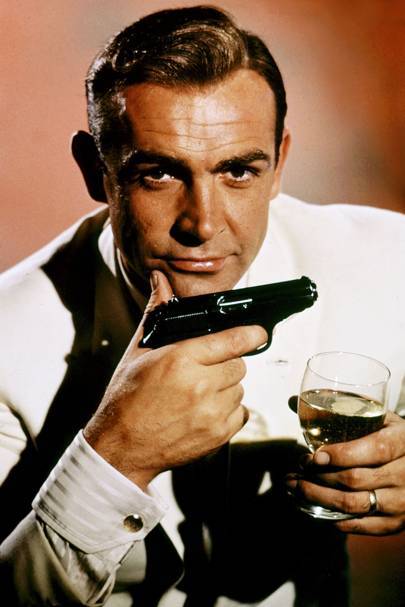
Click through for the definitive guide to the crème de la crop of the greatest spy-thriller saga in all of film history!
#1. North By Northwest (1959)- A staggering achievement for every artist and performer involved. Directed by peak middle-period Hitchcock, and written by Ernest Lehmen, this production stands as a defining role for both Carey Grant and Eva Marie Saint alike. Released only 6 years after the inception of agent 007 (still a creature of spy-thriller novels at this point, another 4 years out from the silver-screen debut), Grant’s performance would leave an indelible mark on the collective unconscious and would surely go on to influence the likes of Connery’s own portrayal years later.
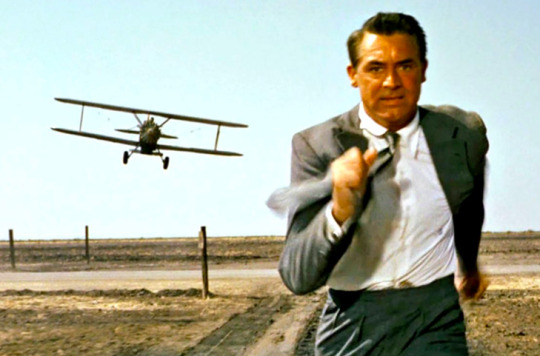
Case-and-point for why Grant excels here is his undeniably amorphous quality. Sure he’d proven his sheer on-screen magnetism for decades by this point, but the dynamic quality of his “character arc”--as the kids like to call it-- in this film speaks for itself. He goes effortlessly from buffoonish in the introductory and more comical part of the movie, to suave and inter-personally-entangled in the middle third, to finally making good on all the romancing and endangerment that the character is thrust into by the final frame.
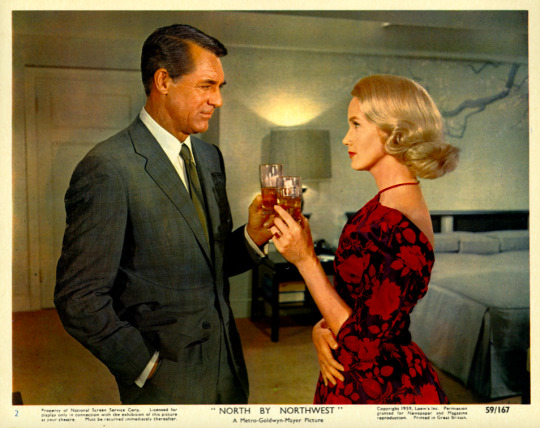
Meanwhile Eva Marie Saint undergoes multiple transformations herself-- a feat pulled off by both her deft acting and the writing/directing alike. She sets a precedent for Bond fatales that isn’t fulfilled for years and years by Bond’s own franchise in that she maintains complexity-- and more importantly agency-- until the last.
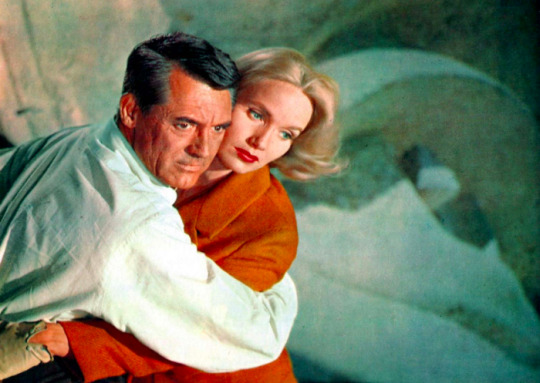
Lastly, Hitchcock himself with Lehmen’s script is able to craft a narrative with visual thrust which balances humor, tension and pacing better than most of his very finest productions. The well-loved cropduster chase-scene is a masterclass in tension and directorial pyrotechnics, and all the heartbreak and salacious revelations that unfold from that moment onward seal the deal for this film as pure unmatched brilliance.
#2 Charade (1963)- A year after Connery’s debut as Bond, a lighter thriller shows a possible alternate-universe for the franchise; one in which Carey Grant maintains his stranglehold on the archetype in lieu of the mad Scotsmen himself.

Director Stanley Donen and writer Peter Stone, clearly taking some inspiration from Hitchcock’s work with Grant, tease out one of the actor's greatest performances in the process, and similarly to North By Northwest, it has equal-parts to do with Grant’s acting as it does the air-tight screenplay and the myriad twists and turns found within.
If North By Northwest starts from a hijinks-ridden tone and works its way towards spy-thriller seriousness, Charade stays madcap and light-hearted throughout its runtime, while only hinting at the tension and stakes that one would come to be accustomed to glimpsing in a proper 007 endeavor.

The fantastic chemistry between Audrey Hepburn and Grant throughout maintains an emotional center around which a whole satellite of criminal and comic figures can orbit in perfect narrative symmetry.
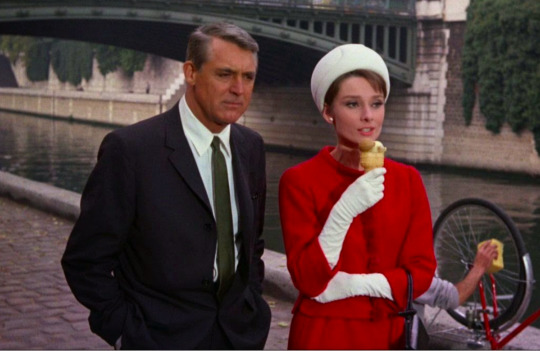
The suspension of clarity when it comes to the nature of Grant’s character might be the ideal pocket from which this renowned thespian operates from, keeping both the audience and Hepburn’s character guessing until the final moments of the runtime. And as the mystery unfolds, Donen is sure to center Paris itself as the immaculate stage from which all of this cinematic pleasure plays out.
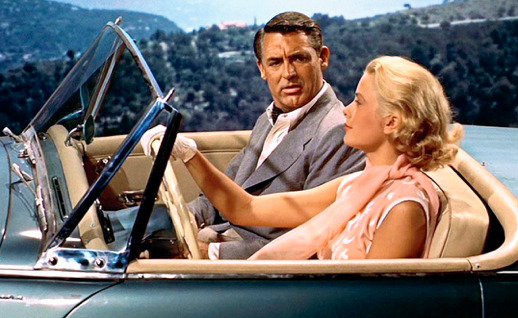
#3- To Catch a Thief (1955)- This film may have traces of North By Northwest-in utero (with plenty more influence for Charade in store), but it's still a phenomenon of its own kind. Hitchcock, working from a John Michael Hayes-penned screenplay is able to catalyze a wholly different kind of thriller from what he’d go on to accomplish with Grant later, and the elusive, mysterious atmosphere would have echoes in masterworks such as Vertigo just a few years later.
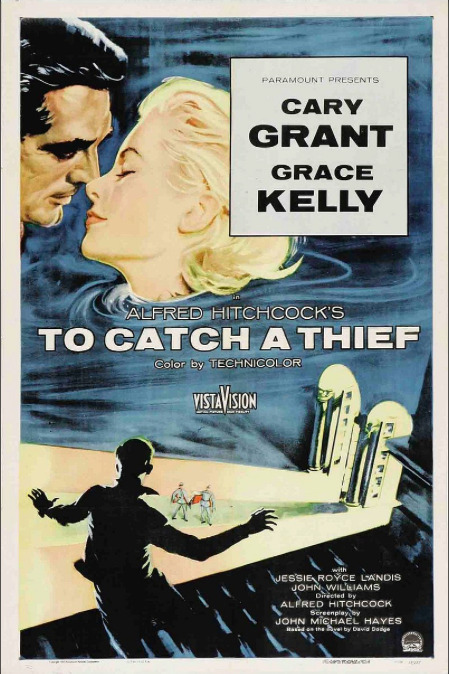
While the plot-beats and the atmosphere may differ heavily from North, the strange twists and turns of Grant and Grace Kelly's characters echo that of Grant and Saint’s roles in the aforementioned film, if perhaps in inverse. Grace Kelly brilliantly-- and a bit psychotically-- somersaults from the role of a mute wallflower, to a coy would-be detective and thrill-seeker, to that of a scorned-- if confused-- romantic throughout the runtime; finally settling as a willing participant to Carey Grant’s ex-cat burglar escapades. Grant’s character is anything but the everyman that he would go on to portray in North, while Kelly’s is far more complex-- and potentially much more unlikeable-- than her character in the then newly minted classic Rear Window.
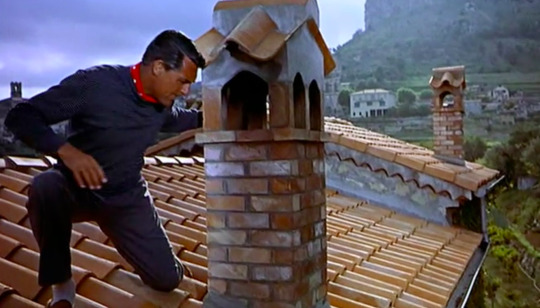
The coastal French Riviera is the setting for this reverse caper in which nothing is as it seems and everything is worth questioning. The script has aged a bit more roughly than other Hitchock masterworks, but the atmosphere-- well supplied by the natural beauty of the Riviera and the green-tint filter of Hitchcock’s nocturnal lens alike-- are a fantastic foundation on which Grant and Kelly flex their adroit acting chops. Grant-- here a still-lithe middle-aged career-criminal-- holds every card except that of Kelly’s heart, and that romantic tension alone sustains the pacing expertly.
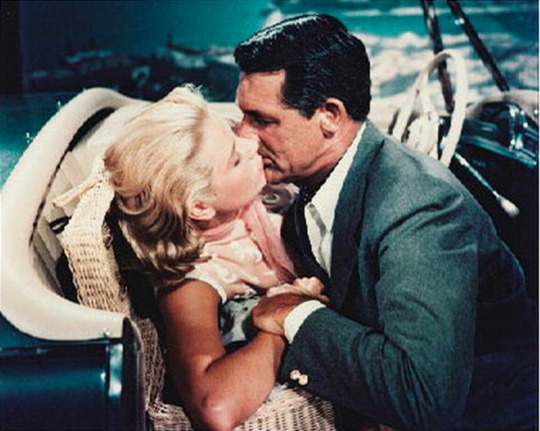
#4- The IPCRESS File (1965)- Tracking down a blu-ray for this early spy-thriller classic is tough but, hey, Michael Caine as the thinking-man’s Bond? Sign me up!
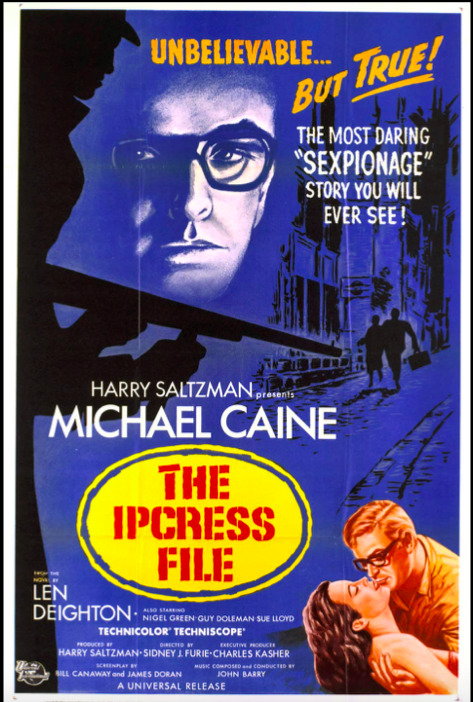
#5 From Russia with Love (1963)- Okay, okay, I give. I’ll give you freaks what you want. A taste of legitimate MI6 realness. This is the grade-A real deal, and it may not feature the stabilized quality-control of Roger Moore’s era or the unwieldy set-pieces of the Brosnan/Craig eras (or the darkness of Dalton’s stint) but it is the follow-up to the premiere of Bond as we know it, and its influence would ripple out for over half a century and counting.
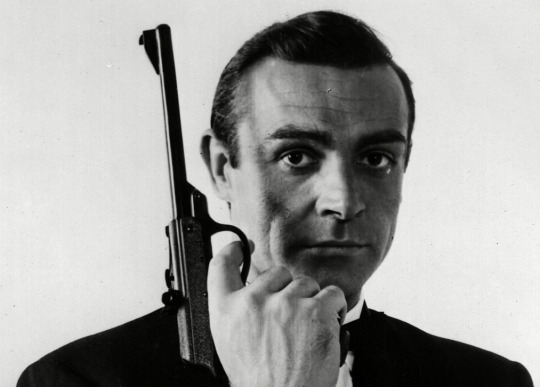
If the previous years’ Dr. No was a test-run, then Russia was proof-of-concept and more. Connery--now equipped with the toupeé he so quickly developed a need for between productions of his premiere as Bond and this--rises to the occasion and makes good on the promise of the first film and then some.

In this outing, we find a lot of ‘firsts’ for the long-lived series: the first gadgets, the first larger-than-life villains and the first-- if not long-lived in this case-- signature vehicles. While the Bentley Mark IV would soon be replaced, the other tropes start to take root. The first sequel in a decades-long series has a lot of responsibility to shoulder in terms of solidifying what aspects of the series will continue ad infinitum, after all, and From Russia largely does a fantastic job of it.

Daniela Bianchi-- an actor too Italian to not be dubbed reportedly-- does an excellent job as an early Bond-movie heroine with some depth, but is outshone largely by Kerim Bay, played by phenomenal Mexican actor Pedro Armendáriz.
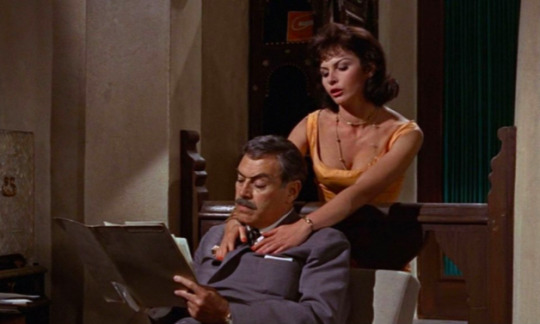
Armendáriz as a British consulate in Istanbul makes a fantastic second-fiddle to Connery’s Bond and fills shoes that often aren’t filled at all-- those of a proper side-kick’s, if not mentor’s that is. His role along with the equally show-stopping villain-de-juor Donald Grant, played by an incredibly menacing Robert Shaw, are the highlights here.

Indeed, his fight-scene with Connery in a train-car towards the end is one of the unique pinnacles of the film and sets high standard for future showdowns. Elsewhere, we find many of the highs that we’ve come to associate with the series at large: rollicking adventure, suave and shady dealings, tension abound et al. And also some of the lows: indeed, towards the middle we find a belly-dancing scene and a Romani cat-fighting scene in close succession which both exemplify the detached misogyny that often factors into much of early Bond. This, on some level, must be expected from the series I suppose-- a transgression readily accepted by actual 007 films yet not found in any of the progenitors that rank higher on my own list, alas.
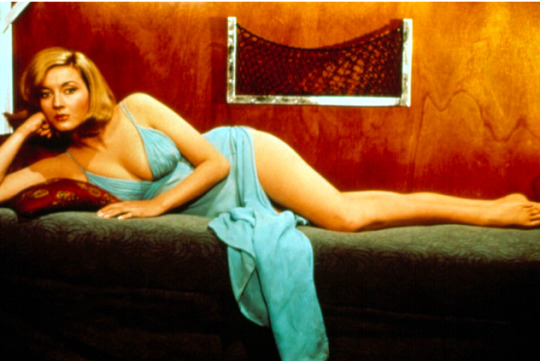
Following the fantastic fight-scene-- a culmination of shenanigans in Istanbul and Connery’s budding-yet-relunctant romance with Bianchi-- we have a North By Northwest homage, except with a helicopter in place of a cropduster, as well as the destruction of a sex-tape of Connery and Bianchi, and that's pretty much the movie! It’s almost a perfect Bond flick.
Runner-ups:
Goldfinger (1964)- Incredibly cast and acted villain, an extended golfing sequence and the debut of the iconic, tricked-out Aston Martin DB5 many would come to associate with the Connery-era films. Sure there’s a bit of rape, but it was the 60s! (so sorry)
[Also the original 'Casino Royale' (1967) and 'A Fish Called Wanda' (1988) almost made the list.]
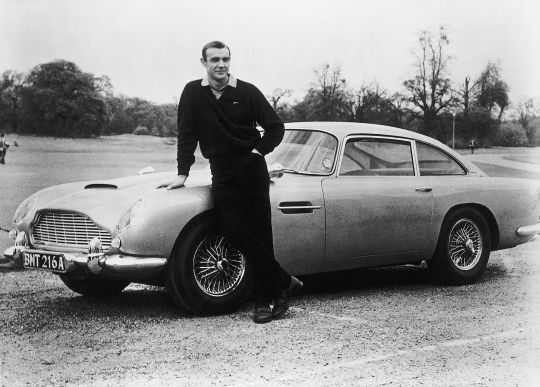
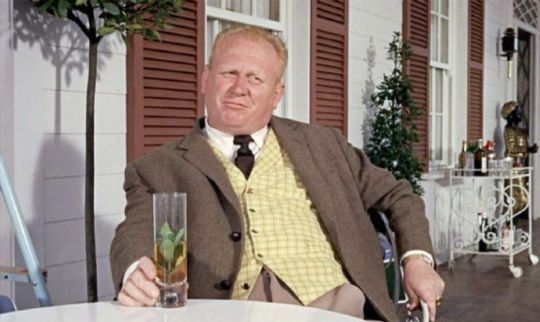
The man with the golden touch, indeed. Sorry for trolling so hard and.... Bond forever~
#bond#James bond#mi6#Ian fleming#Sean connery#carey grant#Audrey hepburn#ava marie saint#grace kelly#hitchcock#Alfred hitchcock#stanley donen#donen#to catch a thief#north by northwest#charade#from Russia with love#goldfinger#ipcress file#the ipcressfile#Michael caine#hollywood#classic film#golden age hollywood#golden age#film#film history
5 notes
·
View notes
Text
ao3 homestuck literature roundup
ok so honestly some of the most impactful pieces of literature I’ve ever consumed... have been fanworks for the web comic Homestuck. while fanfiction in general has the potential for greatness, and there are definitely some non-homestuck works out there i that i’ve enjoyed, Homestuck has a unique potential for spawning creative, original and daring stuff! and there are so many new fans who didn’t even experience the first wave of ao3 webcontent. sadly the site has not proved archival quality when it comes to preserving content, and many fics I’m linking feature broken links/images or have been orphaned by their authors. I’m posting only what I consider to be Good Literature. these are pieces of writing that have struck me, haunted me, and made me cry. Thank you to the writers, and please enjoy! the full rec list is under the cut >:)
old but gold
The Serendipity Gospels by urbanAnchorite (tzm) M
What is there to be said about The Serendipity Gospels? this illustrated fanfiction epic is a true classic. The use of Homestuck language and troll terminology on this fic is exploited to its utmost poetic potential, and every sentence is lyrical. While the story itself is original (and extremely well plotted!), events from the plot of Homestuck are echoed throughout, and it makes for a really satisfying read. This fic was published before Gamrezi was something that happened in the webcomic and gamzee had his downfall, if you’re hesitant to read it on account of the Gamzee<3<Terezi tag. Both of them are extremely well characterized. man... serendipity gospels gamzee is the best gamzee you can find on the market. definitely better than canon gamzee. And the pairing really works. The sad part is that this thing was supposed to be in three acts, and only two have been published. Since 2013... this shit sucks. i want act 3 so bad i’d commit heinous acts to receive it >:0
Cities in Dust (shit let's be hardboiled) by Cephied_Variable T
I’m not finished reading this yet but by now the ao3 handle Cephied_Variable has become a household name. This fic is... heterosexual. and where there were once illustrations, now there are empty white boxes. But the noir setting is played juuuust right, the soundtrack goes hard and it’s really fun to play the music in the next tab while you read, the writing is amazing (obviously) and... not to spoil anything, but it isn’t as much of an AU as it seems. really wish i could see the illustrations, bc the story is told through chatlogs like the source material.
Rule #2 by universe_c E (you can skip the sex scenes tho)
A super imaginative take on what Earth C might have been like. this fic was published while the comic was still updating, so earth c was a very distant possibility in the minds of fans, and in this work, all the players (every single troll, dancestor, human and cherub) are dropped on an uninhabited planet as an entirely new species with varying levels of godpowers, and they have to build civilization from scratch. It’s such an ambitious idea, and it was pulled of brilliantly! the author has more fanfiction online in that takes place in this universe, as well as selections featuring pairings such as Caliborn/Kurloz, an unexpected delight, and GamTav, a charming holdover from simpler times. This story in particular however focuses on Caliborn right after he passes through the gate. He doesn’t have a very easy time adjusting, poor guy. The narrative follows him as he rage-flees from his emotions to nonlinear points on the timeline of Universe C. Along the way he meets the family who he will someday love, learns about the civilization that will develop on their planet, gets laid, and matures a whole lot as a person. This fic is just.. really amazing. Read it!!!
Lost Teeth Like White Jewels by roachpatrol, urbanAnchorite (tzm)
Ok, so roachpatrol used to be a really big name in Homestuck fanfiction, but her stuff has... not aged well, and generally she is regarded (or at least she is regarded by me) as a pedophilic porn peddler, and she’s written a lot of nasty, scandalous smut. but you don’t have to read that stuff! This fic and this fic ONLY (don’t even read the other ones in the series, bro) is just a really nice soap opera. Bodices are ripped, eyes are gazed into in close proximity to an ocean. And the hemospectrum has been inverted. All in all, if you want something dramatic and romantic to read on a rainy day, this fic is where it’s at.
signalbeam is an author that wrote a lot of lesbian fanfiction in 2012. I haven’t personally read all their stuff but it’s all f/f and it’s fun to browse :~)
****DIRKJAKE CORNER******
a thousand years by venusianEye (orphan_account) T
Everything’s set for the surviving players to pass through the gate and claim their Reward... the only problem is, dirk has lost the will to live and is in some kind of mystical coma. Jake is the only person who can save him, by venturing into his mind-palace and solving puzzles that serve as metaphors for everything Dirk can’t express. It’s kind of like inception wrt to the dream mechanics, but the author uses folk tales as settings, and it’s all very poetic, and very well done. this author deleted her account. i watched all the drama. however all her work is still online on the orphan_account. she wrote this series (people who like dirkjake and artistic pornography, give it a read!) and also a medievalstuck au i remember reading and loving, but cannot for the life of me seem to find :( it was about eridan and kanaya and it was good. rest in peace, venusianEye!
A Spark, A Flame, A Fire by callmearcturus E (one skippable sex scene)
The best kingdomstuck ever!!! \(^o^)/ ugh this fic is everything... the author has another kingdomstuck dirkjake multichapter novella online that is also very good, but this one’s my absolute fave :,] the strilonde fam is so cute, and dirk&jake’s blossoming romance (oh, yeah, you BET it’s an arranged marriage AU!) is so romantic it literally makes me clutch my chest and sigh. also the writing and worldbuilding are just IMPECCABLE. another lovely romance for a cozy night.
***JOHNKAT CORNER****
remember johnkat? well,. it’s good.
General Vantas Gets Hitched, or, The Limits Of Bilateral Diplomacy: A Black Powder Romance by JumpingJackFlash M
another arranged marriage fic! seriously, when it’s done right, there can be nothing better. John is the king of Skaia and Karkat is a political insult disguised as a peace offering. No better way to ruin your chances at diplomacy than offer an arranged political marriage between the literal king and a mutant military grunt who isn’t even the right gender. But... what if the king accepts??? omg guys they fall in love... and everyone’s a badass. another notable johnkat offering from his author would b Hurricane , wherein everyone’s punks and dave and tavros are gay rappers. there’s also Space Bro and California Dreaming , which feature karkat/sollux and eridan/equius respectively, and are humanstuck au with vague game memories and are both very sweet and romantic <3
The Only Recipe For Lasagna You'll Ever Need by urbanAnchorite (t_ZM) G
Oh man.. this one’s just really cute.
No Quiet Sleeper by cest_what T
The premise of this fic is a stable little timeloop, so homestuck i could cry, and what occurs therein is extremely adorable :3c
modern fanfiction (post epilogues)
Pilot Light, Pale Rapture by purplebard G
Excellent post-epilogues Jade fic! The writing is beautiful, it’s a really genuine and melancholy work. A masterpiece in JadeDavepeta. I also give a blanket recommendation for all of this author’s fanfic -- it’s deeply original and flawlessly written, every piece!
House of Dirk by IMAC T
If you haven’t read House of Dirk... seriously, read House of Dirk. It’s a modern classic. A dadaist, genre-reconstructive, trope-subverting and absolutely hilarious MASTERPIECE!!! and the characterizations are pitch-perfect. this fanfiction can be cited as the spark which ignited the roaring inferno of Dirk/Caliborn shippers who can now be found online ^__^
mare in ossibus nostris dormit (in our bones sleeps the sea) by liobi
Just some really awesome scourge sisters :,) i love a nice romp through troll mother planet, and this is a flawlessly executed no-game AU.
JADE ROUTE by spicyyeti/muthahomestuckah T
Not technically a fanfiction, because this is 100% a comic, but if you want to read about Homestuck characters in a way that is engaging, innovative, touching and hilarious, you gotta read Jade Route! It’s the best thing that happened to jade since squiddles! the art is REALLY GOOD the characterization is REALLY GOOD god.. i love jade route.
BONES OF BLACK MARROW by oxfordRoulette E
an innovation in dirkjake pornography. this fic will make your head split open, and most of it is pornography of an exceptionally raunchy color. Basically, Dirk summons a demon (Jake) for stupid reasons and it fucks both of their lives up. Incredible work with formatting by the author, seriously who can even code like that, and i love the magical mechanics :) it’s very well researched and it really tears both Dirk and Jake to pieces psychologically. through porn.
Timaeus, Testified by sendificating NR
another fic that uses experimental formatting. It’s all about Dirk and it’s REALLY SO AMAZING.... a detailed and inventive psychological opus.
-
-
Also.... i write fanfiction. sometimes. can’t vouch for the quality but i would be remiss as an author if i didn’t plug . well, that’s all for tonight, folks! hope u find something to read!
108 notes
·
View notes
Text
Star Wars: War of the Bounty Hunters #3
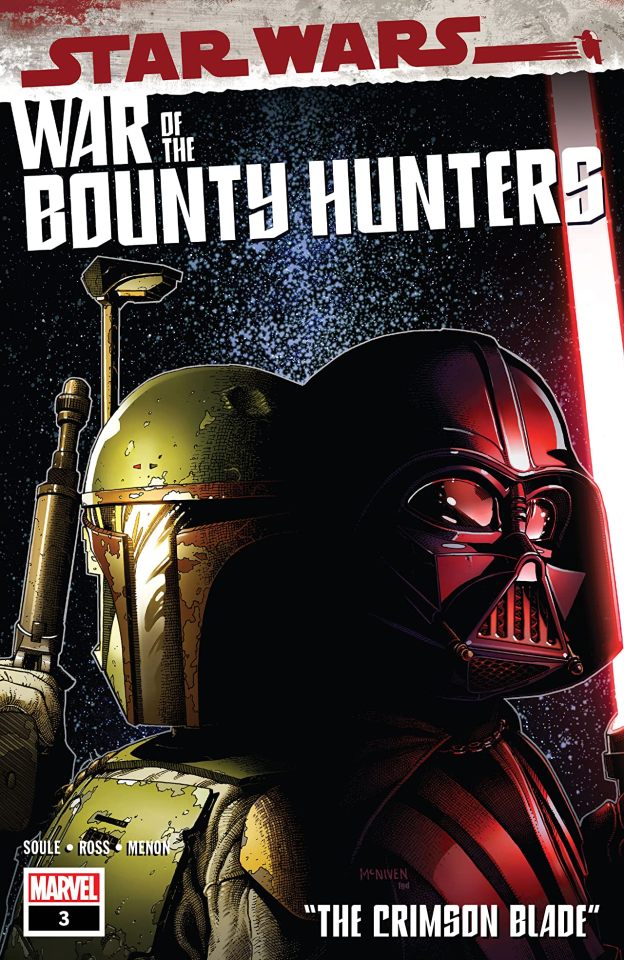
Star Wars: War of the Bounty Hunters #3
Marvel Comics 2021
Written by Charles Soule
Illustrated by Luke Ross & David Messina
Coloured by Neeraj Menon & Guru-eFX
Lettered by VC’s Travis Lanham
WINNER TAKES ALL!
Terrifying, implacable Dark Lord of the Sith DARTH VADER has laid claim to HAN SOLO, who is frozen in carbonite. But the great, exalted JABBA THE HUTT also believes that Solo is his property. It’s the galaxy’s baddest gangster versus the Empire’s most powerful enforcer, and neither is backing down. BOBA FETT is caught between a Sith and a Hutt...and it’s WINNER TAKE ALL
I have been enjoying the heck out of this series! For someone who’s not the biggest Star Wars fan this while a franchise wide story is readable as just as easily read as this single arc on its own. It is a great introduction to the line of characters, it is my first exposure to Doctor Aphra outside of knowing she has a book, as well as encompassing the range of well established characters so that it has this familiar feel to even the casual fan. Charles does this sensational job in creating a story that takes a situation we’re familiar with and turns it into something epic, exciting, fresh and new.
I love the way that this is being told. The story & plot development that we see through how the sequence of events unfold as well as how the reader learns information is presented exceptionally well. The character development that we see through the dialogue, the character interaction as well as how they act and react to the situations and circumstances which they encounter does an utterly marvelous job in establishing their personalities as well as reinforcing what we know about some of them. The pacing is excellent and as it takes us through the pages revealing more and more of the story there’s this electrical charge to the story that grabs you and keeps you grounded to the pages.
I greatly appreciate the way that this is being structured and how we see the layers within the story continue to emerge, grow, evolve and strengthen. What I really like about what we see in the layers is how the story advances, the characterisation and the plot twists & turns all of which add such great depth, dimension and complexity to the story. How we see everything working together to create the story’s ebb & flow as well as how it moves the story forward is impeccably achieved.
The interiors here are absolutely brilliant to see. The linework is clean, crisp and strong and how the varying weights and techniques are being utilised to create the detail work we see throughout the entire issue is so incredibly well rendered. I do wish we’d see more backgrounds being utilised to enhance the moments more. ��Still how we see the composition within the panels bringing out the depth perception, sense of scale and the overall sense of size and scope of the story is amazingly well rendered. The utilisation of the page layouts and how we see the angles and perspective in the panels shows a very talented eye for storytelling. The colour work is brilliantly rendered. How we see the various hues and tones within the colours being utilised to create the shading, highlights and shadow work shows a sensational eye for how colour works.
When Darth Vader showed up last issue the entire party and Han frozen in Carbonite suddenly took a decidedly drastic turn. You’d think that once Vader showed up that things would go smoothly for him but it seems there are those in the universe who are decidedly unafraid of the Dark Sith Lord. This makes for some decidedly great reading too as a very frustrated Vader leaves us with a great cliffhanger ending. With some absolutely stunning writing and dynamic characterisation wrapped up in these gorgeous interiors the battle for Han Solo has begun in earnest.
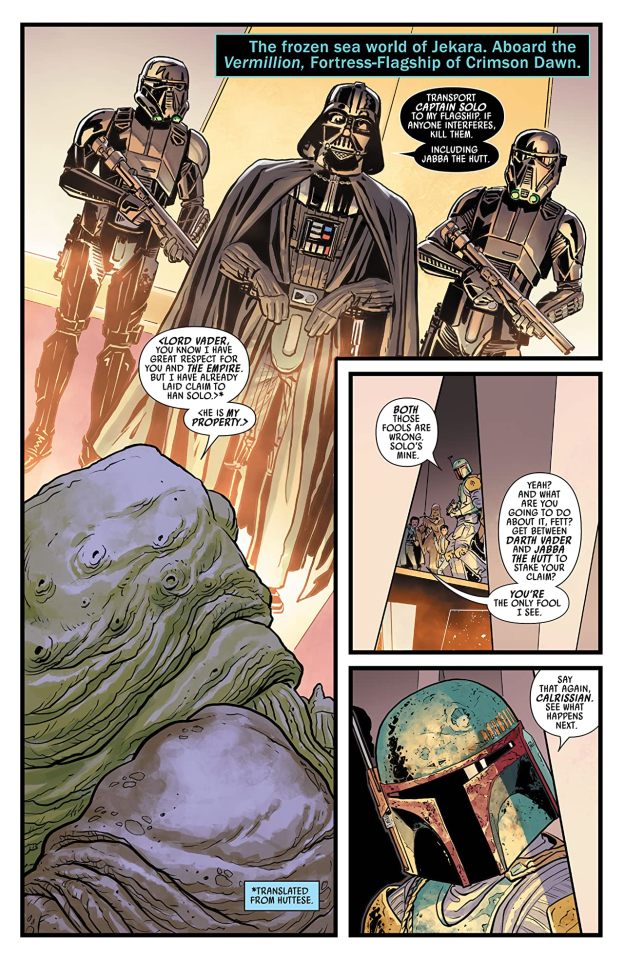
1 note
·
View note
Text
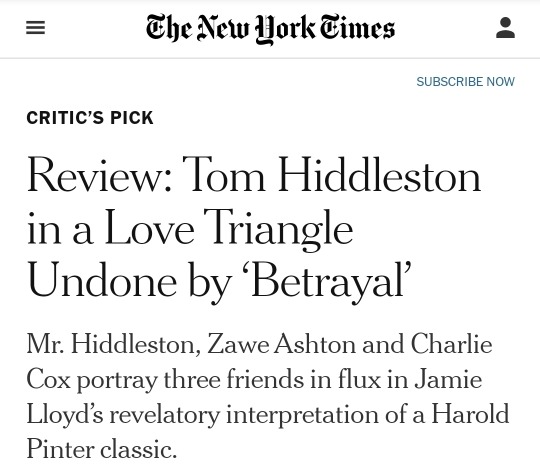
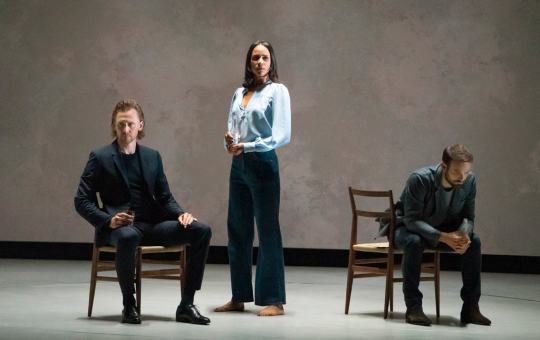
How can a naked space seem so full? Feelings furnish the stage in the resplendently spare new production of Harold Pinter’s “Betrayal,” which opened on Thursday night at the Bernard Jacobs Theater, and they shimmer, bend and change color like light streaming through a prism.
Directed by Jamie Lloyd — and acted with surgical precision by Tom Hiddleston, Zawe Ashton and Charlie Cox — this stripped-down revival of Pinter’s 1978 tale of a sexual triangle places its central characters under microscopic scrutiny, with no place to hide. Especially not from one another, as everybody is on everybody else’s mind, all the time. They are also all almost always fully visible to the audience.
This British version is the most merciless and empathic interpretation of this much performed work I’ve seen, and it keeps returning to my thoughts in piercing shards, like the remnants of a too-revealing dream. I had heard good things about this “Betrayal” when it debuted in London earlier this year, but I didn’t expect it to be one of those rare shows I seem destined to think about forever.
“Betrayal” was dismissed as lightweight by Pinter standards when it opened at the National Theater in London four decades ago, and hearing it described baldly, you can sort of understand why. The high concept pitch could be: “Love among the literati in London leads to disaster, when a publisher discovers his wife is having an affair with his best friend!”
True, the play had an unusual structure, with its reverse chronology. (It begins in 1977 and ends in 1968.) Early critics regarded this as an unnecessary and confusing gimmick. As for all that brittle, passion-concealing wit and straight-faced deception, wasn’t that the stuff of old-guard West End masters like Coward and Rattigan?
With subsequent productions and a first-rate film in 1983 — featuring Jeremy Irons, Ben Kingsley and Patricia Hodge — earlier naysayers began to perceive a creeping depth and delicacy in the work, which for me now ranks among Pinter’s finest. Curiously, despite three starry productions (the most recent led by Daniel Craig and Rachel Weisz), “Betrayal” has never been done full justice on Broadway.
Until now.
Mr. Lloyd’s interpretation balances surface elegance with an aching profundity, so that “Betrayal” becomes less about the anguish of love than of life itself. Specifically, I mean life as lived among people whom we can never truly know. That includes those closest to us; it also includes our own, elusive selves.
The three central characters here are Robert (Mr. Hiddleston); Emma (Ms. Ashton), his wife, a gallerist; and Jerry (Mr. Cox), a literary agent who was the best man at their wedding. Though the majority of the scenes are written for two, Mr. Lloyd keeps all his main characters onstage throughout. (He has also taken the liberty of introducing a fifth, silent character, in addition to the Italian waiter, played with gusto by Eddie Arnold, who appears in the original text.)
That means that when Jerry and Emma are in the rented, out-of-the-way flat where they meet in the afternoons, Robert is present as well — silent, unreacting and at some distance from the others, but undeniably there.
The hoary saying about three being a crowd comes to mind. But then sexual betrayal is inevitably crowded, isn’t it? The absent figure in the triangle is always there as an obstructive phantom, so that no interactions are unconditionally between two people. To borrow from Michael Frayn, whose “Passion Play” is my other favorite 20th-century drama about infidelity, adultery adulterates.
Mr. Lloyd’s “Betrayal” makes us feel this premise all the more acutely, by offering no distractions from the wounded and wounding souls at it center. As designed by the ever-ingenious Soutra Gilmour, and lighted with whispering subtlety by Jon Clark, the set remains a sort of modernist blank slate, like an abandoned contemporary showroom — or, perhaps, laboratory. Nor do the cast members ever change their clothes.
This means the focus is unflinchingly on how these friends and lovers behave, and on the distance between them (wonderfully underscored by a slyly, slowly moving stage). What they say is often as trivial as the most basic small talk. In Pinter, the greatest dramatic weight lies in what’s unspoken, in the darkness of unsorted feelings.
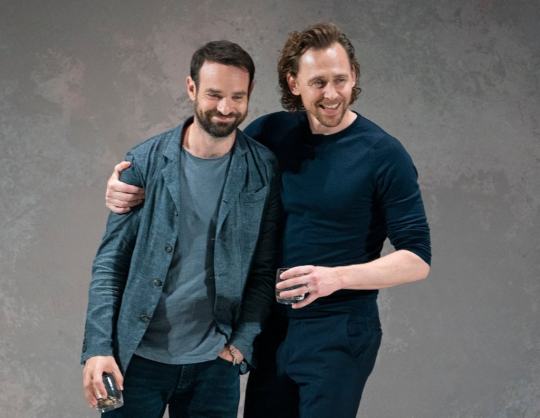
The three principal performers here allow us uncommon access to that darkness. They each achieve a state of heightened emotional transparency. And what we see, in their faces and bodies, and feel — in the less easily described energy that reaches across the footlights — is a harsh and beautiful muddle.
Pinter, like Chekhov, understood that reactions never come singly (though the shrilly opinionated discourse on social media today might lead you to think otherwise). The word “ambivalence” doesn’t begin to cover the thoughts in play in the first scene, when Jerry and Emma uneasily meet in a pub, two years after their affair has ended.
Emma has initiated this encounter. But as played with breathtakingly clear confusion by Ms. Ashton, she can’t explain why she did so. She’s looking for something she misplaced once, or let time carry off, but you know she can’t put her finger on what it is.
As played by the excellent Mr. Cox (best known here as television’s “Daredevil”), Jerry is less palpably unmoored; he would seem to have a thicker skin. And this shifts the center of “Betrayal” to its portrait of a marriage and its corrosive secrets.
As slender and sharp as a paring knife in his dark navy clothing, Mr. Hiddleston’s lacerating Robert seems to live in a state of existential mourning. He can be wittily combative, most memorably in a brilliantly staged restaurant scene with Jerry.
But you’re always aware of the regrets, the uneasiness, the sorrow behind the unbending facade. The scene in a Venice hotel room when he ever so gently, confronts Emma with evidence of her infidelity is almost too painful to watch. What you are witnessing is the conclusive collapse of a marriage’s fragile and necessary structure of illusions.
As a marquee name of films and tabloids, Mr. Hiddleston is the obvious draw here. But it’s the relatively little-known Ms. Ashton (who is also a playwright) who is the breakout star. And her deeply sensitive performance elicits a feminist subtext in “Betrayal.”
Power is a governing dynamic in Pinter. And I’ve seen productions in which Emma, as the only female onstage, emerges as a crushable odd-woman out in a boy’s club society. It’s telling that in this production she is the only major character who doesn’t wear a jacket or, more surprisingly, shoes.
She reads as more vulnerable because of this, but also as more humane and more open to figuring out just what has happened. Emma wants so much — professionally, romantically, domestically. And she’s harrowed by the realization that nothing she thought she had has ever been solidly hers.
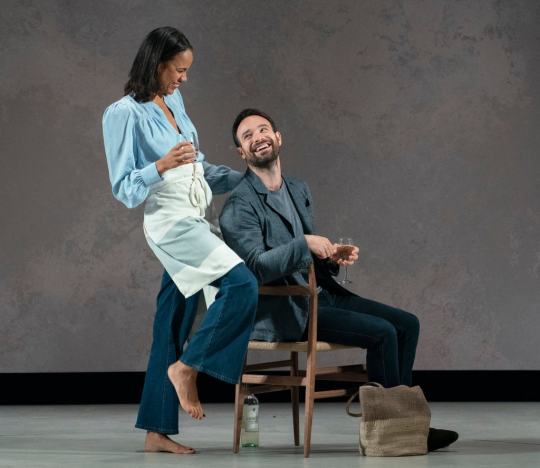
More than ever in this version, which features a melancholy soundscape by Ben and Max Ringham, “Betrayal” becomes an elegy about time and memory, in which nothing stays fixed or certain. There’s new resonance to the continuing references to a joyful moment when Jerry threw Emma and Robert’s little girl into the air at a family gathering.
It’s mentioned in the very first scene, when Emma and Jerry meet again. The problem is they can’t agree on where the event happened, in his kitchen or hers.
Ms. Ashton’s Emma tries to conceal how much this small discrepancy upsets her, but her eyes are brimming. She thought she’d always at least have this memory intact — a vision of everyone, together, happy for a moment. It turns out she was mistaken.
-
[ Link to the full article in source below. ]
#Tom Hiddleston#Zawe Ashton#Charlie Cox#Betrayal Broadway#bernard b jacobs theater#Jamie lloyd production#Harold Pinter play#Theatre tom#Tom hiddleston stage performance#Tom as robert#Zawe as emma#Charlie as jerry#Broadway debut#The New York Times review#New York City
76 notes
·
View notes
Text
In Review: "Oklahoma!"
The first time I saw Oklahoma! live was at the Stratford Shakespeare Festival in Ontario, Canada (in 2006?). I remember turning to my parents and saying:
“That was fantastic, and they really didn’t stray away from the dark part of the show. I don’t think I ever need to see this show again!”
All of this to say that, when the recent St. Ann’s Warehouse production of Oklahoma! first caused a stir at the Warehouse and then again in its move to Circle In The Square, I did not feel the need nor desire to run to see it. I had seen it onstage twice, plus the two filmed versions, and how different could it really be?
So I waited…until last weekend. The second-to-last performance. (How’s that for procrastination?!)
So, was it all that different?
Well, no. But yes? And also really no.
Don’t Throw Bouquets at Me
Most of what I’ve heard people say about this production were things like:
“It’s so dark!"“
“It’s really different!”
“They did some cool, but strange things with it.”
“They took it in a completely new direction.”
“I’ll never see Oklahoma! the same way again!”
“You have to see it. You would appreciate it.”
Some of this I agree with, but some of it I very much do not.
Let’s tackle the idea that this production of Oklahoma! was particularly (thematically) dark: Yes, but no darker than any production of this show really should be.
It seems to me that either - with the number of people whose minds were blown by the production’s darkness - many people had not ever seen Oklahoma! onstage, or just were not aware of the content of the show. But let us not forget - early musical theatre was all dark. It’s written into the DNA of the genre: There is disturbing content (usually intentional, sometimes not) between and underneath all the glitz, glamor, and show tunes.
Examples:
Show Boat - Racism, Prejudice, Abandonment
Carousel - Domestic Abuse, Murder
South Pacific - Racism, Tokenism, War
The King And I - Racism, Colonialism
The Sound Of Music - …I mean, it’s set against the backdrop of Nazism…
And these are just Rodgers/Hart and Rodgers/Hammerstein musicals! Once you start including Lerner & Lowe, Comden & Green, and Kander & Ebb you get more murder, classicism, racism, misogyny, mob mentality, white supremacy, white saviorism, colonialism, capitalism, and so much more.
Now, to be fair, many writers included these themes specifically to subvert them - it’s a large part of why the piece was written (whether or not they accomplished their goal). But it’s undeniable that dark themes have been part of the tradition of musical theatre since its very inception.
Which brings us back to Oklahoma!
This production did not specifically add in dark elements to the story - they already existed. These themes include:
Murder
Rape
Toxic Masculine Behavior
White Male Entitlement
White Privilege
Racism
Misogyny
Mob Mentality
Intentional Othering
Community Crime Cover-Up
Excessive/Irresponsible Gun Usage
White Expansionism/”Manifest Destiny”
Violence or Threatened Violence Used to end Disagreement
And more
What I think this production did brilliantly was something that was ultimately a simple idea, but probably very technically difficult to thread throughout the entire production: They stripped the show of it shiny, musical theatre veneer and let the subtext become the text.
It was very effective.
Don’t Laugh at My Jokes Too Much
What I loved the most about it’s blatant stripping of the musical-theatre-genre-crutch was how often in the show the characters were all just sitting down in chairs spread across the stage, speaking in matter-of-fact tones.
Musical theatre so often relies on stage business, larger-than-life personalities, big voices, over-the-top movements, music, and choreography to provide the “entertainment” side of the evening, all the while hoping that the underlying messages of the show don’t then become lost on the audience.
Oklahoma! took no chances here. When the darkness of the scenes’ text, subtext, or situations were paramount, they stripped all of those other elements away, leaving you to sit with exactly what was being presented to you.
This worked so well that, during intermission and as I was leaving the theatre, I heard people saying things like:
“Is that how it’s always done?”
“Wait, what did they change?”
“There’s no way that’s the actual text.”
But it is! This production just made sure you did not forget it.
Now, that’s not to say that the production didn’t lean into the lighter moments of the show and bring out the comedy, dance, and fun - it totally did. BUT, often the laughter was tentative.
Why?
Much of the humor in Oklahoma! is based upon racist and misogynistic assumptions and, amongst the rest of the stripped down show, you could not laugh your way around that. This was awesome to behold across the audience. (Disclaimer: Not all of the humor is in this vain, and these performers were truly funny.)
The stripping down idea was so pervasive in the show that - at 2 separate moments - there were scenes in complete darkness.
And a couple other times the only light was coming from the live, projected images of the onstage camera capturing the hauntingly intimate moments.
Your senses were heightened, and there was no escaping the show’s text. It was very well done.
Don’t Sigh and Gaze at Me
The sound design was brilliant.
I’m not sure I can stress enough how fantastic the sound design for this show was.
The sporadic and intentional use of handheld mics, live stand mic/monitor setups, wireless mics, no mics, sudden live gunfire, and traveling sound across a circle of rumbling speakers was effective, intelligent, and well-executed.
Additionally, the orchestration was great. I hadn’t been a fan any time I had heard the show performed on award shows or morning shows, but when played live - in the room as intended - the balance was excellent and it added a grounded modernity to the show.
The lighting often confused me.
Some of the choices were beautiful and made a lot of sense: The light for the Act 2 opening dance sequence, the use of the party string lights, having full house lights on for the top of the show, and the pure darkness scene choices.
But then other choices seemed very random and without meaning or intention. Though, perhaps these choices were simply lost on me.
For instance, I was never sure what the intent was behind the full-stage washes of lime green and burnt orange. They seemed to be randomly placed throughout the show. I was also not a fan of taking the entire theatre from pure darkness to full stage and house lights in ~30 fade-ins. This might be due to my light sensitivity though.
The set was purely appropriate and quite effective.
I loved the pervasive wooden look of the entire show. The use of the chairs and tables was excellent. And adorning the walls with rifles was a great touch - not letting you forget what this show is really about.
All in all, the production elements really helped deliver the vision of this production, and often enhanced it far beyond my expectations.
People Will Say We’re In Love
It’s entirely possible that you may gather from this review that I loved the show.
Well, I enjoyed it and I’m glad I saw it.
It was not the mind-blowing experience for me that it seemed to be for many - though this is probably because of that Stratford production I saw in high school that clued me in to the realities of musical theatre’s pervasive dark side.
But I did think it was excellently done and well worth seeing! I appreciate what this production did, and I’m sure I’ll never see an Oklahoma! quite like that ever again.
Only one more comment about the production itself:
Yes, Curly is not a good guy. In fact, no one in this show can be considered a “good guy” - they all have tremendous flaws that negate their more endearing, sympathetic, or empathetic qualities, and can leave you feeling both empty and disgusted.
The choice to change the wedding fight at the end was, in my opinion, not necessarily more effective than having Judd go after Curly openly. It accomplished the same ideas - Judd still threatens by coming to the wedding and bringing a gun, and Curly and Laurey both still want him dead, and everyone is still relieved to have had the excuse to be rid of him. Yay mob justice.
So the change still got the job done. But I remain unconvinced that it was oh-so-different or more effective.
Anywho!
If you missed this one, I would highly suggest (even if just for research) making a trip to TOFT at some point to give it a gander.
OK?
#glamorous life blog#glamorous life#In Review#Oklahoma!#Broadway#Circle In The Square#revival#St. Ann's Warehouse#dark#theme#element#theatre#theater#musical#musical theatre
9 notes
·
View notes
Text
2019 in Movies - My Top 30 Fave Movies (Part 1)
30. GLASS – back in 2000, I went from liking the work of The Sixth Sense’s writer-director M. Night Shyamalan to becoming a genuine FAN thanks to his sneakily revisionist deconstruction of superhero tropes, Unbreakable. It’s STILL my favourite film of his to date, and one of my Top Ten superhero movies EVER, not just a fascinating examination of the mechanics of the genre but also a very satisfying screen origin story – needless to say I’m one of MANY fans who’ve spent nearly two decades holding out hope for a sequel. Flash forward to 2016 and Shyamalan’s long-overdue return-to-form sleeper hit, Split, which not only finally put his career back on course but also dropped a particularly killer end twist by actually being that very sequel. Needless to say 2019 was the year we FINALLY got our PROPER reward for all our patience – Glass is the TRUE continuation of the Unbreakable universe and the closer of a long-intended trilogy. Turns out, though, that it’s also his most CONTROVERSIAL film for YEARS, dividing audiences and critics alike with its unapologetically polarizing plot and execution – I guess that, after a decade of MCU and a powerhouse trilogy of Batman movies from Chris Nolan, we were expecting an epic, explosive action-fest to close things out, but that means we forgot exactly what it is about Shyamalan we got to love so much, namely his unerring ability to subvert and deconstruct whatever genre he’s playing around in. And he really doesn’t DO spectacle, does he? That said, this film is still a surprisingly BIG, sprawling piece of work, even if it the action is, for the most part, MUCH more internalised than most superhero movies. Not wanting to drop any major spoilers on the few who still haven’t seen it, I won’t give away any major plot points, suffice to say that ALL the major players from both Unbreakable and Split have returned – former security guard David Dunn (Bruce Willis) has spent the past nineteen years exploring his super-strength and near-invulnerability while keeping Philadelphia marginally safer as hooded vigilante the Overseer, and the latest target of his crime-fighting crusade is Kevin Wendell Crumb (James McAvoy), the vessel of 24 split personalities collectively known as the Horde, who’s continuing his cannibalistic serial-murder spree through the streets. Both are being hunted by the police, as well as Dr. Ellie Staple (series newcomer Sarah Paulson), a clinical psychiatrist specialising in treating individuals who suffer the delusional belief that they’re superheroes, her project also encompassing David’s former mentor-turned-nemesis Elijah Price (Samuel L. Jackson), the eponymous Mr. Glass, whose life-long suffering from a crippling bone disease that makes his body dangerously fragile has done nothing to blunt the genius-level intellect that’s made him a ruthlessly accomplished criminal mastermind. How these remarkable individuals are brought together makes for fascinating viewing, and while it may be a good deal slower and talkier than some might have preferred, this is still VERY MUCH the Shyamalan we first came to admire – fiendishly inventive, slow-burn suspenseful and absolutely DRIPPING with cool earworm dialogue, his characteristically mischievous sense of humour still present and correct, and he’s retained that unswerving ability to wrong-foot us at every turn, right up to one of his most surprising twist endings to date. The cast are, as ever, on fire, the returning hands all superb while those new to the universe easily measure up to the quality of talent on display – Willis and Jackson are, as you’d expect, PERFECT throughout, brilliantly building on the incredibly solid groundwork laid in Unbreakable, while it’s a huge pleasure to see Anya Taylor-Joy, Spencer Treat Clark (a fine actor we don’t see NEARLY enough of, in my opinion) and Charlayne Woodard get MUCH bigger, more prominent roles this time out, while Paulson delivers an understated but frequently mesmerising turn as the ultimate unshakable sceptic. As with Split, however, the film is comprehensively stolen by McAvoy, whose truly chameleonic performance actually manages to eclipse its predecessor in its levels of sheer genius. Altogether this is another sure-footed step in the right direction for a director who’s finally regained his singular auteur prowess – say what you will about that ending, but it certainly is a game-changer, as boldly revisionist as anything that’s preceded it and therefore, in my opinion, exactly how it SHOULD have gone. If nothing else, this is a film that should be applauded for its BALLS …
29. THE PEANUT BUTTER FALCON – quite possibly the year’s most adorable indie, this dramatic feature debut from documentarian writer-directors Tyler Nilson and Michael Schwartz largely snuck in under the radar on release, but has gone on to garner some well-deserved critical appreciation and sleeper hit success. The lion’s share of the film’s success must surely go to the inspired casting, particularly in the central trio who drive the action – Nilson and Schwartz devised the film with Zack Gotsagen, an exceptionally talented young actor with Down’s Syndrome, specifically in mind for the role of Zak, a wrestling obsessive languishing in a North Carolina retirement home who dreams of escaping his stifling confines and going to the training camp of his hero, the Saltwater Redneck (Thomas Haden Church), where he can learn to become a pro wrestler; after slipping free, Zak enlists the initially wary help of down-at-heel criminal fisherman Tyler (Shia LaBaouf) in reaching his intended destination, while the pair are pursued by Zak’s primary caregiver, Eleanor (Dakota Johnson). Needless to say the unlikely pair bond on the road, and when Eleanor is reluctantly forced to tag along with them, a surrogate family is formed … yeah, the plot is so predictable you can see every twist signposted from miles back, but that familiarity is never a problem because these characters are so lovingly written and beautifully played that you’ve fallen for them within five minutes of meeting them, so you’re effortlessly swept along for the ride. The three leads are pure gold – this is the most laid back and cuddly Shia’s been for years, but his lackadaisical charm is pleasingly tempered with affecting pathos driven by a tragic loss in Tyler’s recent past, while Johnson is sensible, sweet and likeably grounded, even when Eleanor’s at her most exasperated, but Gotsagen is the real surprise, delivering an endearingly unpredictable, livewire performance that blazes with true, honest purity and total defiance in the face of any potential difficulties society may try to throw at Zak – while there’s excellent support from Church in a charmingly awkward late-film turn that goes a long way to reminding us just what an acting treasure he is, as well as John Hawkes and rapper Yelawolf as a pair of lowlife crab-fishermen hunting for Tyler, intending to wreak (not entirely undeserved) revenge on him for an ill-judged professional slight. Enjoying a gentle sense of humour and absolutely CRAMMED with heartfelt emotional heft, this really was one of the most downright LOVEABLE films of 2019.
28. PET SEMATARY – first off, let me say that I never saw the 1989 feature adaptation of Stephen King’s story, so I have no comparative frame of reference there – I WILL say, however, that the original novel is, in my opinion, one of the strongest offerings from America’s undisputed master of literary horror, so any attempt made to bring it to the big screen had better be a good one. Thankfully, this version more than delivers in that capacity, proving to be one of the more impressive of his cinematic outings in recent years (not quite up to the standard of The Mist or It Chapter 1, perhaps, but certainly on a par with the criminally overlooked 1408), as well as one of the year’s top horror offerings. This may be the feature debut of directing double-act Kevin Kölsch and Dennis Widmyer, but they both display a wealth of natural talent here, wrangling bone-chilling scares and a pervading atmosphere of oppressive dread to deliver a top-notch screen fright-fest that works its way under your skin and stays put for days after. Jason Clarke is a classic King everyman hero as Boston doctor Louis Creed, displaced to the small Maine town of Ludlow as he trades the ER for a quiet clinic practice so he can spent more time with his family – Amy Seimetz (Upstream Color, Stranger Things), excellent throughout as his haunted, emotionally fragile wife Rachel, toddler son Gage (twins Hugo and Lucas Lavole), and daughter Ellie (newcomer Jeté Laurence, BY FAR the film’s biggest revelation, delivering to the highest degree even when her role becomes particularly intense). Their new home seems idyllic, the only blots being the main road at the end of their drive which experiences heavy traffic from speeding trucks, and the children’s pet cemetery in the woods at the back of their garden, which has become something of a local landmark. But there’s something far darker in the deeper places beyond, an ancient place of terrible power Louis is introduced to by their well-meaning but ultimately fallible elderly neighbour Jud (one of the best performances I’ve ever seen from screen legend John Lithgow) when his daughter’s beloved cat Church is run over. The cat genuinely comes back, but he’s irrevocably changed, the once gentle and lovable furball now transformed into a menacingly mangy little psychopath, and his resurrection sets off a chain of horrific events destined to devour the entire family … this is supernatural horror at its most inherently unnerving, mercilessly twisting the screws throughout its slow-burn build to the inevitable third act bloodbath and reaching a bleak, soul-crushing climax that comes close to rivalling the still unparalleled sucker-punch of The Mist – the adaptation skews significantly from King’s original at the mid-point, but even purists will be hard-pressed to deny that this is still VERY MUCH in keeping with the spirit of the book right up to its harrowing closing shot. The King of Horror has been well served once again – fans can rest assured that his dark imagination continues to inspire some truly great cinematic scares …
27. THE REPORT – the CIA’s notorious use of torture to acquire information from detainees in Guantanamo Bay and various other sites around the world in the wake of September 11, 2001, has been a particularly spiky political subject for years now, one which has gained particular traction with cinema-goers over the years thanks to films like Rendition and, of course, controversial Oscar-troubler Zero Dark Thirty. It’s also a particular bugbear of screenwriter Scott Z. Burns (The Bourne Ultimatum, Contagion, Side Effects) – his parents are both psychologists, and he found it particularly offensive that a profession he knows was created to help people could have been turned into such a damaging weapon against the human psyche, inexorably leading him to taking up this passion project, championed by its producer, and Burns’ long-time friend and collaborator, Steven Soderbergh. It tells the true story of Senate staffer Daniel Jones’ five-year battle to bring his damning 6,300-page study of the CIA’s enhanced interrogation program, commissioned by the Senate Intelligence Committee, into the light of day in the face of increasingly intense and frequently underhanded resistance from the Agency and various high-ranking officials within the US Government whose careers could be harmed should their own collusion be revealed. In lesser hands this could have been a clunky, unappetisingly dense excuse for a slow-burn political thriller that drowned in its own exposition, but Burns handles the admittedly heavyweight material with deft skill and makes each increasingly alarming revelation breathlessly compelling while he ratchets up the tension by showing just what a seemingly impossible task Jones and his small but driven team faced. The film would have been nought, however, without a strong cast, and this one has a killer – taking a break from maintaining his muscle-mass for Star Wars, Adam Driver provides a suitably robust narrative focus as Jones, an initially understated workman who slowly transforms into an incensed moral crusader as he grows increasingly filled with righteous indignation by the vile subject matter he’s repeatedly faced with, and he’s provided with sterling support from the likes of Annette Bening, delivering her best performance in years as Senator Dianne Feinstein, Jones’ staunchest supporter, the ever-wonderful Ted Levine as oily CIA director John O. Brennan, Tim Blake Nelson as a physician contracted by the CIA to assist with interrogations who became genuinely disgusted by the horrors he witnessed, and Matthew Rhys as an unnamed New York Times reporter Jones considers leaking the report to when it looks like it might never be released. This is powerful stuff, and while it may only mark Burns’ second directorial feature (after his obscure debut Pu-239), he handles the gig like a seasoned pro, milking the material for every drop of dramatic tension while keeping the narrative as honest, forthright and straightforward as possible, and the end result makes for sobering, distressing and thoroughly engrossing viewing. Definitely one of the most important films not only of 2019, but of the decade itself, and one that NEEDS to be seen.
26. DARK PHOENIX – wow, this really has been a year for mistreated sequels, hasn’t it? There’s a seriously stinky cloud of controversy surrounding what is now, in light of recent developments between Disney and Twentieth Century Fox, the last true Singer-era X-Men movie, a film which saw two mooted release dates (first November 2018 then the following February, before finally limping onto screens with very little fanfare in June 2019, almost as if Fox wanted to bury it. Certainly rumours of its compromise were rife, particularly regarding supposed rushed reshoots because of clashing similarities with Marvel’s major tent-pole release Captain Marvel (and given the all-conquering nature of the MCU there was no way they were having that, was there?), so like many I was expecting a clunky mess, maybe even a true stinker to rival X-Men Origins: Wolverine. In truth, while it’s not perfect, the end result is nothing like the turd we all feared – the final film is, in fact, largely a success, worthy of favourable comparison with its stronger predecessors. It certainly makes much needed amends for the disappointing mismanagement of the source comics’ legendary Dark Phoenix saga in 2006’s decidedly compromised original X-Men trilogy capper The Last Stand, this time treating the story with the due reverence and respect it deserves as well as serving as a suitably powerful send-off for more than one beloved key character. Following the “rebooted” path of the post-Days of Future Past timeline, it’s now 1992, and after the world-changing events of Apocalypse the X-Men have become a respected superhero team with legions of fans and their own personal line to the White House, while mutants at large have mostly become accepted by the regular humans around them. Then a hastily planned mission into space takes a turn for the worst and Jean Grey (Game of Thrones’ Sophie Turner) winds up absorbing an immensely powerful, thoroughly inexplicable cosmic force that makes her powers go haywire while also knocking loose repressed childhood traumas Professor Charles Xavier (James McAvoy) would rather had stayed buried, sending her on a dangerous spiral out of control which leads to a destructive confrontation and the inadvertent death of a teammate. Needless to say, the situation soon becomes desperate as Jean goes on the run and the world starts to turn against them all once again … all in all, then, it’s business as usual for the cast and crew of one of Fox’s flagship franchises, and it SHOULD have gone off without a hitch. When Bryan Singer opted not to return this time around (instead setting his sights on Queen biopic Bohemian Rhapsody), key series writer Simon Kinberg stepped into the breach for his directorial debut, and it turns out he’s got a real talent for it, giving us just the kind of robust, pacy, thrilling action-packed epic his compatriot would have delivered, filled with the same thumping great set-pieces (the final act’s stirring, protracted train battle is the unequivocal highlight here), well-observed character beats and emotional resonance we’ve come to expect from the series as a whole (then again, he does know these movies back to frond having at least co-written his fair share). The cast, similarly, are all on top form – McAvoy and Michael Fassbender (as fan favourite Erik Lehnsherr, aka Magneto) know their roles so well now they can do this stuff in their sleep, but we still get to see them explore interesting new facets of their characters (particularly McAvoy, who gets to reveal an intriguing dark side to the Professor we’ve only ever seen hinted at before now), while Turner finally gets to really breathe in a role which felt a little stiff and underexplored in her series debut in Apocalypse (she EASILY forges the requisite connective tissue to Famke Janssen’s more mature and assured take in the earlier films); conversely Tye Sheridan (Cyclops), Alexandra Shipp (Storm), Kodi Smit-McPhee (Nightcrawler) and Evan Peters (Quicksilver) get somewhat short shrift but nonetheless do A LOT with what little they have, and at least Jennifer Lawrence and Nicholas Hoult still get to do plenty of dramatic heavy lifting as the last of Xavier’s original class, Raven (Mystique) and Hank McCoy (Beast); the only real weak link in the cast is the villain, Vuk, a shape-shifting alien whose quest to seize the power Jean’s appropriated is murkily defined at best, but at least Jessica Chastain manages to invest her with enough icy menace to keep things from getting boring. All in all, then, this is very much a case of business as usual, Kinberg and co keeping the action thundering along at a suitably cracking pace throughout (powered by a typically epic score from Hans Zimmer), and the film only really comes off the rails in its final moments, when that aforementioned train finally comes off its tracks and the reported reshoots must surely kick in – as a result this is, to me, most reminiscent of previous X-flick The Wolverine, which was a rousing success for the majority of its runtime, only coming apart in its finale thanks to that bloody ridiculous robot samurai. The climax is, therefore, a disappointment, too clunky and sudden and overly neat in its denouement (we really could have done with a proper examination of the larger social impact of these events), but it’s little enough that it doesn’t spoil what came before … which just makes the film’s mismanagement and resulting failure, as well as its subsequent treatment from critics and fans alike, all the more frustrating. This film deserved much better, but ultimately looks set to be disowned and glossed over by most of the fanbase as the property as a whole goes through the inevitable overhaul now that Disney/Marvel owns Fox and plans to bring the X-Men and their fellow mutants into the MCU fold. I feel genuinely sorry for the one remaining X-film, The New Mutants, which is surely destined for spectacular failure after its similarly shoddy round of reschedules finally comes to an end this summer …
25. IT CHAPTER 2 – back in 2017, Mama director Andy Muschietti delivered the first half of his ambitious two-film adaptation of one of Stephen King’s most popular and personal novels, which had long been considered un-filmable (the 90s miniseries had a stab, but while it deserves its cult favourite status it certainly fell short in several places) until Muschietti and screenwriters Cary Joji Fukunaga and Gary Dauberman seemingly did the impossible, and the end result was the top horror hit of the year. Ultimately, then, it was gonna be a tough act to follow, and there was MAJOR conjecture whether they could repeat that success with this second half. Would lightning strike twice? Well, the simple answer is … mostly. 2017’s Chapter 1 was a stone-cold masterpiece, and one of the strongest elements in its favour was the extremely game young cast of newcomers and relative unknown child actors who brought the already much beloved Loser’s Club to perfectly-cast life, a seven-strong gang of gawky pre-teen underdogs you couldn’t help loving, which made it oh-so-easy to root for them as they faced off against that nightmarish shape-shifting child-eating monster, Pennywise the Dancing Clown. It was primal, it was terrifying, and it was BURSTING with childhood nostalgia that thoroughly resonated with an audience hungry for more 80s-set coming-of-age genre fare after the runaway success of Stranger Things. Bringing the story into the present day with the Losers now returning to their childhood home of Derry, Maine as forty-something adults, Chapter 2 was NEVER going to achieve the same pulse-quickening electric charge the first film pulled off, was it? Thankfully, with the same director and (mostly) the same writing crew on hand (Fukunaga jumped ship but Dauberman was there to finish up with the help of Jason Fuchs and an uncredited Jeffrey Jurgensen) there’s still plenty of that old magic left over, so while it’s not quite the same second time round, this still feels very much like the same adventure, just older, wiser and a bit more cynical. Here’s a more relevant reality check, mind – those who didn’t approve of the first film’s major changes from the book are going to be even more incensed by this, but the differences here are at least organic and in keeping with the groundwork laid in Chapter 1, and indeed this film in particular is a VERY different beast from the source material, but these differences are actually kind of a strength here, Muschietti and co. delivering something that works MUCH better cinematically than a more faithful take would have. Anyway, the Loser’s Club are back, all grown up and (for the most part) wildly successful living FAR AWAY from Derry with dream careers and seemingly perfect lives. Only Mike Hanlon has remained behind to hold vigil over the town and its monstrous secret, and when a new spree of disappearances and grisly murders begins he calls his old friends back home to fulfil the pact they all swore to uphold years ago – stop Pennywise once and for all. The new cast are just as excellent as their youthful counterparts – Jessica Chastain and James McAvoy are, of course, the big leads here as grown up Beverley Marsh and Bill Denbrough, bringing every watt of star power they can muster, but the others hold more interest, with Bill Hader perfectly cast (both director and child actor’s personal first choice) as smart-mouth Richie Tozier, Isaiah Mustafah (best known as the Old Spice guy from those hilarious commercials) playing VERY MUCH against type as Mike, Jay Ryan (successful on the small screen in Top of the Lake and Beauty & the Beast, but very much getting his cinematic big break here) as a slimmed-down and seriously buffed-out Ben Hanscom, James Ransone (Sinister) as neurotic hypochondriac Eddie Kaspbrak, and Andy Bean (Power, the recent Swamp Thing series) as ever-rational Stan Uris – but we still get to hang out with the original kids too in new flashbacks that (understandably) make for some of the film’s best scenes, while Bill Skarsgard is as terrifying as ever as he brings new ferocity, insidious creepiness and even a touch of curious back-story to Pennywise. I am happy to report this new one IS just as scary as its predecessor, a skin-crawling, spine-tingling, pants-wetting cold sweat of a horror-fest that works its way in throughout its substantial running time and, as before, sticks with you LONG after the credits have rolled, but it’s also got the same amount of heart, emotional heft and pathos, nostalgic charm (albeit more grown-up and sullied) and playful, sometimes decidedly mischievous geeky humour, so that as soon as you’re settled in it really does feel like you’ve come home. It’s also fiendishly inventive, the final act in particular skewing in some VERY surprising new directions that there’s NO WAY you’ll see coming, and the climax also, interestingly, redresses one particularly frustrating imbalance that always bugged me about the book, making for an especially moving, heartbreaking denouement. Interestingly, there’s a running joke in the film that pokes fun at a perceived view from some quarters that Stephen King’s endings often disappoint – there’s no such fault with THIS particular adaptation. For me, this was altogether JUST the concluding half I was hoping for, so while it’s not as good as the first, it should leave you satisfied all the same.
24. MOTHERLESS BROOKLYN – it’s taken Edward Norton twenty years to get his passion project adaptation of Jonathan Lethem’s novel to the big screen, but the final film was certainly worth the wait, a cool-as-ice noir thriller in which its writer-director also, of course, stars as one of the most unusual ‘tecs around. Lionel Essrog suffers from Tourette syndrome, prone to uncontrollable ticks and vocal outbursts as well as obsessive-compulsive spirals that can really ruin his day, but he’s also got a genius-level intellect and a photographic memory, which means he’s the perfect fit for the detective agency of accomplished, highly successful New York gumshoe Frank Minna (Bruce Willis). But when their latest case goes horribly wrong and Frank dies in a back-alley gunfight, the remaining members of the agency are left to pick up the pieces and try to find out what went wrong, Lionel battling his own personal, mental and physical demons as he tries to unravel an increasingly labyrinthine tangle of lies, deceit, corporate corruption and criminal enterprise that reaches to the highest levels of the city’s government. Those familiar with the original novel will know that it’s set in roughly the present day, but Norton felt many aspects of the story lent themselves much better to the early 1950s, and it really was a good choice – Lionel is a man very much out his time, a very odd fit in an age of stuffy morals and repression, while the themes of racial upheaval, rampant urban renewal and massive, unchecked corporate greed feel very much of the period. Besides, there’s few things as seductive than a good noir thriller, and Norton has crafted a real GEM right here. The pace can be a little glacial at times, but this simply gives the unfolding plot and extremely rich collection of characters plenty of room to grow, while the jazzy score (from up-and-comer Daniel Pemberton, composer on Steve Jobs, King Arthur: Legend of the Sword and Spider-Man: Into the Spider-Verse) provides a surprising complimentary accompaniment to the rather free-form narrative style and Lionel’s own scattershot, bebop style. Norton is exceptional in the lead, landing his best role in years with an exquisitely un-self-conscious ease that makes for thoroughly compelling viewing (surely more than one nod will be due come awards-season), but he doesn’t hog ALL the limelight, letting his uniformly stellar supporting cast shine bright as well – Willis doesn’t get a huge amount of screen time, but delivers a typically strong, nuanced performance that makes his absence throughout the rest of the film keenly felt, Gugu Mbatha-Raw continues to build an impressive run of work as Laura, the seemingly unimportant woman Lionel befriends, who could actually be the key to the whole case, Alec Baldwin is coolly menacing as power-hungry property magnate and heavyweight city official Moses Randolph, the film’s nominal big-bad, Willem Dafoe is absolutely electrifying as his down-at-heel, insignificant genius brother Lou, and Boardwalk Empire’s Michael K. Williams is quietly outstanding as mysterious jazz musician Trumpet Man, while Bobby Canavale, Ethan Suplee and Dallas Roberts are all excellent as the other hands in Minna’s detective agency. It’s a chilled-out affair, happy to hang back and let its slow-burn plot simmer while Lionel tries to navigate his job and life in general while battling his many personal difficulties, but due to the incredible calibre of the talent on offer, the incredibly rich dialogue and obligatory hardboiled gumshoe voiceover, compelling story and frequently achingly beautiful visuals, this is about as compulsively rewarding as cinema gets. Norton’s crafted a film noir worthy of comparison with the likes of L.A. Confidential and Chinatown, proving that he’s a triple-threat cinematic talent to be reckoned with.
23. PROSPECT – I love a good cinematic underdog, there’s always some dynamite indies and sleepers that just about slip through the cracks that I end up championing every year, and one of 2019’s favourites was a minor sensation at 2018’s South By Southwest film festival, a singularly original ultra-low-budget sci-fi adventure that made a genuine virtue of its miniscule budget. Riffing on classic eco-minded space flicks like Silent Running, it introduces a father-and-daughter prospecting team who land a potentially DEEPLY lucrative contract mining for an incredibly rare element on a toxic jungle moon – widower Damon (Transparent’s Jay Duplass), who’s downtrodden and world-weary but still a dreamer, and teenager Cee (relative newcomer Sophie Thatcher), an introverted bookworm with hidden reserves of ingenuity and fortitude. The job starts well, Damon setting his sights on a rumoured “queen’s layer” that could make them rich beyond their wildest dreams, but when they meet smooth-talking scavenger Ezra (Narcos’ Pedro Pascal), things take a turn for the worse – Damon is killed and Cee is forced to team up with Ezra to have any hope for survival on this hostile, unforgiving moon. Thatcher is an understated joy throughout, her seemingly detached manner belying hidden depths of intense feeling, while Pascal, far from playing a straight villain, turns Ezra into something of a tragic, charismatic antihero we eventually start to sympathise with, and the complex relationship that develops between them is a powerful, mercurial thing, the constantly shifting dynamic providing a powerful driving force for the film. Debuting writer-directors Zeek Earl and Chris Caldwell have crafted a wonderfully introspective, multi-layered tone poem of aching beauty, using subtle visual effects and a steamy, glow-heavy colour palette to make the lush forest environs into something nonetheless eerie and inhospitable, while the various weird and colourful denizens of this deadly little world prove that Ezra may be the LEAST of the dangers Cee faces in her quest for escape. Inventive, intriguing and a veritable feast for the eyes and intellect, this is top-notch indie sci-fi and a sign of great things to come from its creators, thoroughly deserving of major cult recognition in the future.
22. DRAGGED ACROSS CONCRETE – S. Craig Zahler is a writer-director who’s become a major fixture on my ones-to-watch list in recent years, instantly winning me over with his dynamite debut feature Bone Tomahawk before cementing that status with awesome follow-up Brawl On Cell Block 99. His latest is another undeniable hit that starts deceptively simply before snowballing into a sprawling urban crime epic as it follows its main protagonists – disgraced Bulwark City cops Brett Ridgeman (Mel Gibson) and Tony Lurasetti (BOCB99’s Vince Vaughn), on unpaid suspension after their latest bust leads to a PR nightmare – on a descent into a hellish criminal underworld as they set out to “seek compensation” for their situation by ripping off the score from a bank robbery spearheaded by ruthlessly efficient professional thief Lorentz Vogelmann (Thomas Kretschmann). In lesser hands, this two-hour-forty-minute feature might have felt like a painfully padded effort that would have passed far better chopped down to a breezy 90-minutes, but Zahler is such a compellingly rich and resourceful writer that every scene is essential viewing, overflowing with exquisitely drawn characters spouting endlessly quotable, gold-plated dialogue, and the constantly shifting narrative focus brings such consistent freshness that the increasingly complex plot remains rewarding right to the end. The two leads are both typically excellent – Vaughn gets to let loose with a far more showy, garrulous turn here than his more reserved character in his first collaboration with Zahler, while this is EASILY the best performance I’ve seen Gibson deliver in YEARS, the grizzled veteran clearly having a fine old time getting his teeth into a particularly meaty role that very much plays to his strengths – and they’re brilliantly bolstered by an excellent supporting cast – Get Rich Or Die Tryin’s Tory Kittles easily matches them in his equally weighty scenes as Henry Johns, a newly-released ex-con also out to improve his family’s situation with a major score, while Kretschmann is at his most chilling as the brutal killer who executes his plans with cold-blooded precision, and there are wonderful scene-stealing offerings from Jennifer Carpenter, Udo Kier, Don Johnson (three more Zahler regulars, each featured with Vaughn on BOCB99), Michael Jai White, Laurie Holden and newcomer Miles Truitt. This is a proper meaty film, dark, intense, gritty and unflinching in its portrayal of honest, unglamorous violence and its messy aftermath, but fans of grown-up filmmaking will find PLENTY to enjoy here, Zahler crafting a crime epic comparable to the heady best of Scorsese and Tarantino. Another sure-fire winner from one of the best new filmmakers around.
21. FAST COLOR – intriguingly, the most INTERESTING superhero movie of the year was NOT a major franchise property, or even a comic book adapted to the screen at all, but a wholly original indie which snuck in very much under the radar on its release but is surely destined for cult greatness in the future, not least due to some much-deserved critical acclaim. Set in an unspecified future where it hasn’t rained for years, a homeless vagabond named Ruth (Gugu Mbatha-Raw) is making her aimless way across a desolate American Midwest, tormented by violent seizures which cause strange localised earthquakes, and hunted by Bill (Argo’s Christopher Denham), a rogue scientist who wants to capture her so he can study her abilities. Ultimately she’s left with no other recourse than to run home, sheltering with her mother Bo (Middle of Nowhere and Orange is the New Black’s Lorraine Toussaint), and her young daughter Lila (The Passage’s Saniyya Sidney), both of whom also have weird and wondrous powers of their own. As the estranged family reconnect, Ruth finally learns to control her powers as she’s forced to confront her own troubled past, but as Bill closes in it looks like their idyll might be short-lived … this might only be the second feature of writer-director Julie Hart (who cut her teeth penning well-regarded indie western The Keeping Room before making her own debut helming South By Southwest Film Festival hit Miss Stevens), but it’s a blinding statement of intent for the future, a deceptively understated thing of beauty that eschews classic superhero cinema conventions of big spectacle and rousing action in favour of a quiet, introspective character-driven story where the unveiling and exploration of Ruth and her kin’s abilities are secondary to the examination of how their familial dynamics work (or often DON’T), while Hart and cinematographer Michael Fimognari (probably best known for his frequent work for Mike Flanagan) bring a ruined but bleakly beautiful future to life through inventively understated production design and sweeping, dramatic vistas largely devoid of visual effects. Subtlety is the watchword, but that doesn’t mean that there aren’t fireworks here, it’s just that they’re generally performance-based – awards-darling Mbatha-Raw (Belle) gives a raw, heartfelt performance, painting Ruth in vivid shades of grey, while Toussaint is restrained but powerfully memorable and Sidney builds on her already memorable work to deliver what might be her best turn to date, and there are strong supporting turns from Denham (who makes his nominal villain surprisingly sympathetic) and Hollywood great David Strathairn as gentle small town sheriff Ellis. Leisurely paced and understated it may be, but this is still an incendiary piece of work, sure to become a breakout sleeper hit for a filmmaking talent from whom I expect GREAT THINGS in the future, and since the story’s been picked up for expansion into a TV series with Hart in charge that looks like a no-brainer. And it most assuredly IS a bona fide superhero movie, despite appearances to the contrary …
#glass#glass movie#the peanut butter falcon#pet sematary#the report#dark phoenix#it chapter 2#motherless brooklyn#prospect#prospect movie#dragged across concrete#fast color#2019 in movies
11 notes
·
View notes
Link
How can a naked space seem so full? Feelings furnish the stage in the resplendently spare new production of Harold Pinter’s “Betrayal,” which opened on Thursday night at the Bernard Jacobs Theater, and they shimmer, bend and change color like light streaming through a prism.
Directed by Jamie Lloyd — and acted with surgical precision by Tom Hiddleston, Zawe Ashton and Charlie Cox — this stripped-down revival of Pinter’s 1978 tale of a sexual triangle places its central characters under microscopic scrutiny, with no place to hide. Especially not from one another, as everybody is on everybody else’s mind, all the time. They are also all almost always fully visible to the audience.
This British version is the most merciless and empathic interpretation of this much performed work I’ve seen, and it keeps returning to my thoughts in piercing shards, like the remnants of a too-revealing dream. I had heard good things about this “Betrayal” when it debuted in London earlier this year, but I didn’t expect it to be one of those rare shows I seem destined to think about forever.
“Betrayal” was dismissed as lightweight by Pinter standards when it opened at the National Theater in London four decades ago, and hearing it described baldly, you can sort of understand why. The high concept pitch could be: “Love among the literati in London leads to disaster, when a publisher discovers his wife is having an affair with his best friend!”
True, the play had an unusual structure, with its reverse chronology. (It begins in 1977 and ends in 1968.) Early critics regarded this as an unnecessary and confusing gimmick. As for all that brittle, passion-concealing wit and straight-faced deception, wasn’t that the stuff of old-guard West End masters like Coward and Rattigan?
With subsequent productions and a first-rate film in 1983 — featuring Jeremy Irons, Ben Kingsley and Patricia Hodge — earlier naysayers began to perceive a creeping depth and delicacy in the work, which for me now ranks among Pinter’s finest. Curiously, despite three starry productions (the most recent led by Daniel Craig and Rachel Weisz), “Betrayal” has never been done full justice on Broadway.
Until now.
Mr. Lloyd’s interpretation balances surface elegance with an aching profundity, so that “Betrayal” becomes less about the anguish of love than of life itself. Specifically, I mean life as lived among people whom we can never truly know. That includes those closest to us; it also includes our own, elusive selves.
The three central characters here are Robert (Mr. Hiddleston); Emma (Ms. Ashton), his wife, a gallerist; and Jerry (Mr. Cox), a literary agent who was the best man at their wedding. Though the majority of the scenes are written for two, Mr. Lloyd keeps all his main characters onstage throughout. (He has also taken the liberty of introducing a fifth, silent character, in addition to the Italian waiter, played with gusto by Eddie Arnold, who appears in the original text.)
That means that when Jerry and Emma are in the rented, out-of-the-way flat where they meet in the afternoons, Robert is present as well — silent, unreacting and at some distance from the others, but undeniably there.
The hoary saying about three being a crowd comes to mind. But then sexual betrayal is inevitably crowded, isn’t it? The absent figure in the triangle is always there as an obstructive phantom, so that no interactions are unconditionally between two people. To borrow from Michael Frayn, whose “Passion Play” is my other favorite 20th-century drama about infidelity, adultery adulterates.
Mr. Lloyd’s “Betrayal” makes us feel this premise all the more acutely, by offering no distractions from the wounded and wounding souls at it center. As designed by the ever-ingenious Soutra Gilmour, and lighted with whispering subtlety by Jon Clark, the set remains a sort of modernist blank slate, like an abandoned contemporary showroom — or, perhaps, laboratory. Nor do the cast members ever change their clothes.
This means the focus is unflinchingly on how these friends and lovers behave, and on the distance between them (wonderfully underscored by a slyly, slowly moving stage). What they say is often as trivial as the most basic small talk. In Pinter, the greatest dramatic weight lies in what’s unspoken, in the darkness of unsorted feelings.
The three principal performers here allow us uncommon access to that darkness. They each achieve a state of heightened emotional transparency. And what we see, in their faces and bodies, and feel — in the less easily described energy that reaches across the footlights — is a harsh and beautiful muddle.
Pinter, like Chekhov, understood that reactions never come singly (though the shrilly opinionated discourse on social media today might lead you to think otherwise). The word “ambivalence” doesn’t begin to cover the thoughts in play in the first scene, when Jerry and Emma uneasily meet in a pub, two years after their affair has ended.
Emma has initiated this encounter. But as played with breathtakingly clear confusion by Ms. Ashton, she can’t explain why she did so. She’s looking for something she misplaced once, or let time carry off, but you know she can’t put her finger on what it is.
As played by the excellent Mr. Cox (best known here as television’s “Daredevil”), Jerry is less palpably unmoored; he would seem to have a thicker skin. And this shifts the center of “Betrayal” to its portrait of a marriage and its corrosive secrets.
As slender and sharp as a paring knife in his dark navy clothing, Mr. Hiddleston’s lacerating Robert seems to live in a state of existential mourning. He can be wittily combative, most memorably in a brilliantly staged restaurant scene with Jerry.
But you’re always aware of the regrets, the uneasiness, the sorrow behind the unbending facade. The scene in a Venice hotel room when he ever so gently, confronts Emma with evidence of her infidelity is almost too painful to watch. What you are witnessing is the conclusive collapse of a marriage’s fragile and necessary structure of illusions.
As a marquee name of films and tabloids, Mr. Hiddleston is the obvious draw here. But it’s the relatively little-known Ms. Ashton (who is also a playwright) who is the breakout star. And her deeply sensitive performance elicits a feminist subtext in “Betrayal.”
Power is a governing dynamic in Pinter. And I’ve seen productions in which Emma, as the only female onstage, emerges as a crushable odd-woman out in a boy’s club society. It’s telling that in this production she is the only major character who doesn’t wear a jacket or, more surprisingly, shoes.
She reads as more vulnerable because of this, but also as more humane and more open to figuring out just what has happened. Emma wants so much — professionally, romantically, domestically. And she’s harrowed by the realization that nothing she thought she had has ever been solidly hers.
More than ever in this version, which features a melancholy soundscape by Ben and Max Ringham, “Betrayal” becomes an elegy about time and memory, in which nothing stays fixed or certain. There’s new resonance to the continuing references to a joyful moment when Jerry threw Emma and Robert’s little girl into the air at a family gathering.
It’s mentioned in the very first scene, when Emma and Jerry meet again. The problem is they can’t agree on where the event happened, in his kitchen or hers.
Ms. Ashton’s Emma tries to conceal how much this small discrepancy upsets her, but her eyes are brimming. She thought she’d always at least have this memory intact — a vision of everyone, together, happy for a moment. It turns out she was mistaken.
36 notes
·
View notes
Text
Scrubs (yes the sitcom)
Seasons 1-8 since we’re not touching season 9 and its new cast.
A sitcom that, by its fourth episode, showed (as it would continue to show) that it was at its best when it was at its most heartbreaking, because those were often the moments that it was also at its most heartwarming. The theme of “My Old Lady” (the fourth episode) is really that you can’t save everyone and death is indeed scary (a recurring theme in Scrubs), and you have to acknowledge that. But even in that fear, there are beautiful moments too, and taking the time to breathe and feel the sun and find something warm even in those moments can get you through them.
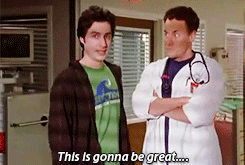
Dr. Kelso, Dr. Cox, Jordan, Elliott, Turk, and Carla were my favorite characters, though everyone was well done, from JD to Laverne to the Janitor. Jordan was just... an enjoyable twist on the devil woman archetype. For that matter, almost every character was really a hyperbolic, exaggerated character for comedic effect. Elliott’s eccentricities, Kelso’s cruelty, Cox’s grumpiness, Ted’s cowardice and incompetence, Todd’s sexuality, JD’s need for approval--they were all exaggerated for comedic purposes (which ties into why things weren’t ruined for me with those characters, but they could be for other people and it’s legit if so). Elliott was relatable in her anxieties, her parental issues, her relationship struggles. Cox’s breakdown in season 5 really got me, and Laverne--along with Turk and Cox’s sister Paige--all had their faith treated as an important part of their character just as Cox’s atheism was an important part of his, which I appreciated. Everyone was respected.
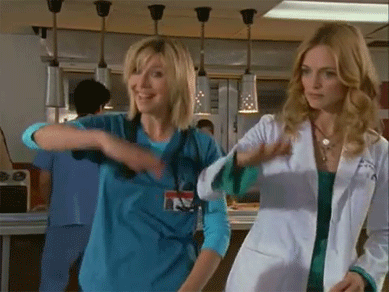
i also enjoyed how different seasons focused on slowly building up towards a breakdown of different characters. For example, Carla and Turk in season 4, JD and Cox in season 5 (kept focusing more than normal on his arrogance and that went places). The relationships were also really well written and enjoyable. From the Janitor and Lady, to Ted and Gooch, to Cox and Jordan, Elliott and JD, and of course Carla and Turk, each couple had their own unique foiling and unique strengths that made them appealing together. Their personalities always remained unique, but together they made something beautiful. And the friendships were just as powerful.

I appreciated that a main theme was that there are no easy answers. Be it professionally, relationally, grief, marriage, parenting--nothing is easy, but that doesn’t mean it’s miserable either. As Dr. Kelso says in season 4, “nothing worth having comes easy.” The nuance was great in this show. For me in particular, the episodes that focused on grief (and a LOT of them did) were incredibly cathartic and healing for me, as I’ve been working through my dad’s death over the past year.
The show was really good. The soundtrack was always on point--music as a whole was brilliantly used in this series. I highly recommend it if you want a feel-good show that doesn’t avoid even the darker aspects of life, and if you’re wrangling with grief.

Of course, it’s got its issues too. It hasn’t aged well, like at all, in how it portrays race and especially in its portrayal of sexual harassment. Todd Quinlan is basically Mineta from BNHA as a doctor--but somehow still likable/has redeeming qualities. STill, Todd’s actions are really despicable (as are Dr. Kelso’s towards his wife) even while played for comedy, and none of these things would fly today as funny, nor should they. But within the context of the series as a whole, in my personal opinion they didn’t ruin it for me even if I cringed. I still liked Todd and loved Dr. Kelso as characters.
Season 8 in particular was weaker than the other seasons, and if it weren’t for the writer’s strike in season 7 which cut it very short, I kind of think season 7 would have wrapped the show up. Season 8 had less budget, so the main characters didn’t always appear in episodes, and the jokes were a bit more... insensitive/cheap rather than clever like in the past (it switched networks between seasons 7 and 8 too). That being said, Season 8 did magnificently conclude the characters’ arcs, with Kelso stepping into a mentor role and a new friendship with Cox, to Cox and Jordan’s relationship, Carla and Turk’s, Elliott finding her worth and feeling as if it was okay to chase her desires, Ted and the Janitor both finding love with Gooch and Lady respectively, and everyone passing the torch to the new interns, wherein our cast became the teachers.
For my favorite episodes:
My Old Lady (season 1 episode 4). This episode really set the whole theme and tone of the show, and deserved the award it won.
My Own Personal Jesus (season 1 episode 11). A hilarious rendition of “The Twelve Days of Christmas” and the really cool theme of Christmas spirit made this great.
My Dream Job (season 2 episode 22). The last minutes of this episode were pure satisfactory gold that also marked a really important step in Dr. Cox’s, Elliott’s, and Dr. Kelso’s characters, and honestly JD’s as well. Also Ryan Reynolds guest-stars.
My Own American Girl (season 3 episode 1). This is one of the few ones on here for mostly comedy. “My machines!” is one of the funniest scenes I’ve ever seen.
My Brother Where Art Thou (Season 3 episode 5). Scrubs has a habit of doing excellent mini, cross-season arcs with its minor characters, and JD’s brother Dan had a great arc that continued in every episode he appeared in over the seasons. But his moment with Dr. Cox at the end makes this my favorite of the Dan episodes.
My Friend, the Doctor (season 3 episode 8). I loved the development for the Janitor.
My Screw-Up (season 3 episode 14). Like with Dan, Ben’s episodes as the brother of Jordan and best friend of Dr. Cox all really stood out, and this one’s twist at the end, plus expert foreshadowing, made it fantastic viewing.
My Boss’ Free Haircut (season 4 episode 20). Dr. Kelso’s humanity begins to emerge more, and his speech to his patient and to Turk is what I referenced above. It also deals with Carla and Turk’s marital issues in an empathetic way, and Carla is given room to grieve for her mom in a way that really resonated with me.
My New God (season 5 episode 5). Cox’s reveal of his childhood and interactions with Paige--a character who easily could have been played for ridicule but was instead given empathy for her beliefs just as Cox was--resonated with me.
My Bright Idea (season 5 episode 16). From JD’s hilarious slip-up in front of the priest to Carla and Turk’s pregnancy reveal in the episode’s final episodes, it was golden all the way through. I cried from happiness in this episode.
My Lunch & My Fallen Idol (season 5 episodes 20-21). I don’t remember the last time I cried so hard at a show/movie since Hodor died in Game of Thrones. It was based on a real case, and helped me cope with my own grief, in addition to giving a powerful development to Cox and JD’s relationship. I think these are the two best episodes.
My Musical (season 6 episode 6). Despite the idea of making an episode a musical, the premise for why it was a musical was clever, and the songs (”Guy Love” in particular) were hilarious.
My Long Goodbye (season 6 episode 15). Within a week of watching “My Lunch,” I watched this one and cried just as hard. This episode and the one that comes before it are really powerful, but they hurt.
My Cold Shower (Season 6 episode 19). Despite Elliott making a mistake, the way her friends are all genuinely happy for her and JD’s realization in the end that he loves her were... moving.
My Dumb Luck (season 7 episode 9). The episode that shows you just how much Dr. Kelso developed, from character you loved because you hated him to character you saw how much he cared. It was the perfect development for him.
My Princess (season 7 episode 11). A really clever use of a fairy-tale AU, and a powerful story too that allowed for Jordan and Cox to have one of their more humanizing, tender moments. Yet again, in the end though, the implications aren’t that you can save everyone, but even in failure, there’s something to believe in.
My Full Moon (season 8, episode 13) On the whole I think season 8 is the weakest of the acknowledged seasons (I’ve no interest in season 9) but it does have some really lovely conclusions, like I said, and this one concluded Elliott’s arc in a satisfying way. As she’s one of my faves, and as it has a really well-acted scene where she tells a patient they are HIV positive (as HIV awareness and decreasing the stigma are very important to me), it’s one of my favorites.
My Finale (Part 2) (season 8, episode 19) A really excellent final scene and a powerful series message.
#scrubs#hamliet reviews#elliott reid#john dorian#chris turk#carla espinosa#perry cox#jordan sullivan#kelso
138 notes
·
View notes